

Holocaust Center of Pittsburgh Generations speaker offers a ‘Night of Hope and Hops’

Rabbi James Gibson upholds civic responsibilities while ‘failing retirement’
 By David Rullo | Senior Sta Writer
By David Rullo | Senior Sta Writer

Deborah Leuchter Stueber has two passions: telling the story of her parents who survived the Holocaust and craft beer.
Stueber’s father and mother weren’t yet teens in Austria and Germany when Adolf Hitler rose to power and they witnessed the horrors of Kristallnacht, as well as the Nazis’ arrest, detention and murder of most of the Jewish population. Her father, Kurt, joined the resistance, battling against the German army. He and his wife-to-be, Edith, eventually made it to the United States and raised a family.
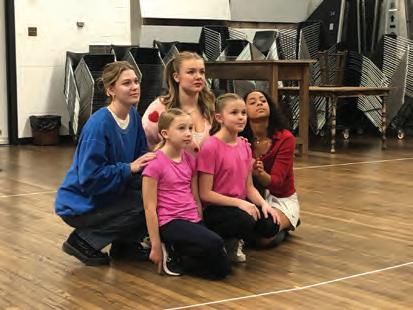

It is a compelling story and one Stueber has recounted in schools, libraries and churches — a familiar circuit for those discussing the Holocaust and the story of its survivors. Now she’s combining her two passions and bringing her family’s chronicle to craft beer breweries.
Pittsburgh, Stueber said, is home to a burgeoning craft brew scene, with more than 40 breweries in Allegheny County. She’s

even the administrator of a Facebook group, Pittsburgh Beer Ladies, that has more than 3,000 members.
It was on a trip visiting Two Frays Brewery in Garfield that an idea struck Stueber. She approached the owner of the brewery and asked if she could speak there. Surprisingly, the owner agreed. The brewery, she said, had a series called “Thinkers and Drinkers.”
“He said, ‘You will be perfect,’” she remembered.
From there, the Blawnox resident traveled to East End Brewing Company’s Mount Lebanon Taproom.
She’ll next bring her parents’ story to Grist House Craft Brewing in Millvale on Tuesday, March 26, a day when the space is typically not open. She’s also lined up a talk at Acclamation Brewing in Verona in November as part of Holocaust Education Month.
Stueber’s passion for craft beer has helped her understand what locations make sense to visit.
By Adam Reinherz | Senior Sta Writer
Rabbi
That’s what Gibson, 69, said when describing his role with the Pittsburgh Commission on Human Relations, a governmental agency chartered under the city’s code and answerable to the mayor’s office.
Once a month, Gibson and fellow commissioners “promote justice and understanding” by investigating alleged acts of misconduct to “decrease unfair treatment and discrimination,” according to the commission’s website.
Complaints brought to the commission, Gibson noted, may involve employment, housing, public accommodations or city services provided by a city employee.
Within Pittsburgh there are “protected classes, which include race, religion, creed, LGBTQIA status and disability,” Gibson said.
“If you are concerned that any of these factors, which are protected classes under the







 James Gibson is “failing retirement.”
James Gibson is “failing retirement.”
city February 23, 2024 | 14 Adar I 5784 Candlelighting 5:46 p.m. | Havdalah 6:46 p.m. | Vol. 67, No. 8 | pittsburghjewishchronicle.org $2 Please see Gibson, page 11 Please see Beer, page 11 NOTEWORTHY LOCAL A focus on Jewish-Christian relations
Page
rare look
Squirrel
Professor Ruth Langer to speak at Saint Vincent College
2 HISTORY Outsiders take a
at
Hill
Page
LOCAL
1963 study of community by grad students
3
Keep 'em laughing
South
Page 16 LOCAL CLO and PSO collaborate for concert
Comedian Chris Monty comes to
the
Hills
Page 16
"Fiddler on the Roof" at Heinz Hall
Rabbi James Gibson
Photo by Dale Lazar
Kurt and Edith Leuchter raise a glass at a Florida brewery. Their daughter, Deborah, is now telling their survival story in local breweries around Pittsburgh.
Begins on page 6 JodiJacobson / iStock / Getty Images Plus EventPlanning
Photo provided by Deborah Stueber
Headlines
Theologian returns to Pittsburgh with call for improving Jewish-Christian relations
By Adam Reinherz | Senior Staff Writer
Ruth Langer is looking ahead by being historic.
On Feb. 28, the professor of Jewish studies at Boston College and former Pittsburgh resident will return to Western Pennsylvania to address “Lent and Easter through Jewish eyes” at Saint Vincent College.
The upcoming talk, Langer said, will focus on “places in the observance, particularly Easter, that we can understand better if we understand the Jewish background that it draws on.”
Comprehending first-century Jewish life or “the parting of the ways” isn’t necessary to derive benefit from Langer’s talk, she said: “Hopefully the academics will get something out of it, but I will use vocabulary and explanations that are accessible to everybody.”
For more than 20 years, the professor has focused on Jewish-Christian relations, with a specific interest in liturgy.
Her book, “Cursing the Christians: A History of the Birkat HaMinim,” probes the Amidah’s 12th blessing.
The earliest form of that daily prayer, according to Langer, cursed Christians, apostates, sectarians and enemies of Israel.
Over time, however, the text was amended.
Its present form, according to many English-translated Ashkenazi siddurim, now reads: “Let there be no hope for informers and may all wickedness instantly perish; may all the enemies of Your people be swiftly cut off, and may You quickly uproot, crush, rout and subdue the insolent, speedily in our days. Blessed are You, Master, Crusher of enemies and Subduer of the insolent.”
Langer is happy to talk texts but also faith, as along with her doctorate she holds rabbinic ordination.
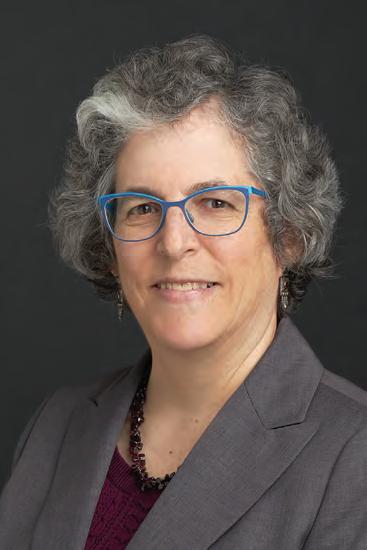
Having semicha, she explained, adds to the richness of her work.
“I’m in a theology department — as opposed to a religious studies context or Jewish studies context — and theology is significantly applied study of religion, it’s supposed to matter,” she said. “And so, for my career, working to improve relations between Jews and Christians, on both sides, has been a way of doing something that matters, that has, hopefully, some impact on the world.”
For many, envisioning a world where people of diverse faith can respectfully coexist is hard to imagine.
Langer said harmony is possible, but understanding history is a prerequisite.
Thanks to “Nostra aetate,” an official declaration of Vatican II made by Pope Paul VI in 1965, relations between Jews and Christians have “vastly improved over the last 50 or 60 years,” she said. “There’s still rockiness, and some of that rockiness has shown up in the last couple months since Oct. 7.”
When asked to describe the state of
Jewish-Christian relations since the start of the Israel-Hamas war, Langer said that, generally, “Catholic universities have been overall safe spaces for Jewish students.”
The academician said she suspects that’s due to the presence of a “moral voice at the Catholic campuses.”
“Part of that moral voice is that antisemitism is a sin — so then you have to figure out what antisemitism is, that’s a different matter — but it means that there are relationships built, there’s those concepts, there’s ideas, which led to overall a great sense of horror at the initial Hamas assault,” she said. “There is also a horror at the reality for the situation for people in Gaza right now, but that’s more muted and balanced in the Catholic world than it is in the parts of the Christian world where a relationship with Jews and Judaism has not come as far along.”
Langer is optimistic that interfaith dealings can improve.
“Certainly better education of the clergy and the students in seminary into the realities of Jewish-Christian relations, its history and its sensitivities would be one of my key recommendations,” she said.
Still, whether diverse practitioners of faith can achieve mutual respect is often predicated on the makeup of their worship spaces, Langer explained.
“A church with a top-down authority structure has vehicles for making these sorts of changes easily,” she said. That can be harder in churches with a more congregational model, she continued, “because authority goes from the bottom-up, and the bottom isn’t necessarily deeply educated theologically or religiously.”
For Langer, there’s a biographical element to improving Jewish-Christian relations.
She grew up in Squirrel Hill on Mount Royal Road and attended Colfax Elementary and Middle School before graduating from

SUBSCRIPTIONS
subscriptions@pittsburghjewishchronicle.org 412-687-1000, ext. 2
TO ADVERTISE
advertising@pittsburghjewishchronicle.org 412-687-1000, ext. 1
EDITORIAL DEPARTMENT
Email:
newsdesk@pittsburghjewishchronicle.org
BOARD OF TRUSTEES
Evan H. Stein, Board Chair
Gayle R. Kraut, Secretary
Evan Indianer, Immediate Past Chair
Gail Childs, Dan Droz, Malke Steinfeld Frank, Seth Glick, Tammy Hepps, Judith Kanal, Cátia Kossovsky, Charles Saul, Derek Smith
GENERAL COUNSEL
Stuart R. Kaplan, Esq.
Taylor Allderdice High School.
Her family, she said, traces its ties to Pittsburgh since the 1830s.
“My grandfather, my great-grandfather and maybe my great-great-grandfather, were real leaders at Rodef Shalom,” she said. “I still remember my grandfather [Marcus Lester Aaron] going to board meetings and ritual committee meetings, or worship committee, when he was in his late 80s. He was still a figure to be reckoned with in the congregation.”
Langer left Pittsburgh more than 40 years ago but has returned periodically to intern at Rodef Shalom, speak at the congregation and visit family.
“It’s definitely the place of my roots,” she said. “I think that, in many ways, the interreligious work that I’ve been doing is a piece of my Pittsburgh legacy.”
Recently, Langer has focused on the liturgies of J. Leonard Levy, who was rabbi at Rodef Shalom from 1901 to 1917.
“He was my grandfather’s childhood rabbi, and one of the things he really did — and that I saw with his successors — was reach out and build relationships with the Christian community,” she said. “I feel that in some ways I’m continuing that legacy, that piece of what Rodef Shalom stood for in those years.”
Langer has dedicated her career to JewishChristian relations but said ordination, tenure or a comprehensive knowledge of liturgy isn’t needed to improve a relationship.
“What really matters is to build relationships at all levels, but especially with the people who can call out to their own communities and say, ‘Hey, wait a second, what do you think you’re doing?’ And that only happens when you are literally building those relationships,” she said. “It doesn’t happen if we just turn inward.” PJC
Adam Reinherz can be reached at areinherz@pittsburghjewishchronicle.org.
5915 Beacon St., 5th Floor Pittsburgh, PA 15217
Main phone number: 412-687-1000
Subscriptions: 412-687-1000, ext. 2
Jim Busis, CEO and Publisher 412-228-4690 jbusis@pittsburghjewishchronicle.org
EDITORIAL
Toby Tabachnick, Editor 412-228-4577 ttabachnick@pittsburghjewishchronicle.org
Andy Gotlieb, Contributing Editor
Adam Reinherz, Senior Staff Writer 412-687-1000 areinherz@pittsburghjewishchronicle.org
David Rullo, Senior Staff Writer 412-687-1000 drullo@pittsburghjewishchronicle.org
ADVERTISING
Amy Weiss, Account Executive (412) 613-0697 aweiss@pittsburghjewishchronicle.org
PRODUCTION
Jeni Mann Tough
Production Manager
Carl Weigel
Art/Production Coordinator
Subscriptions
subscriptions@pittsburghjewishchronicle.org 412-687-1000,

Chronicle become the property of this publication, which is not responsible for the return or loss of such items.
The Pittsburgh Jewish Chronicle does not endorse the goods or services advertised or covered in its pages and makes no representation to the kashrut of food products and services in said advertising or articles. The publisher is not liable for damages if, for any reason whatsoever, he fails to publish an advertisement or for any error in an advertisement. Acceptance of advertisers and of ad copy is subject to the publisher’s approval. The Pittsburgh Jewish Chronicle is not responsible if ads violate applicable laws and the advertiser will indemnify, hold harmless and defend the Pittsburgh Jewish Chronicle from all claims made by governmental agencies and consumers for any reason based on ads appearing in the Pittsburgh Jewish Chronicle

2 FEBRUARY 23, 2024 PITTSBURGH JEWISH CHRONICLE PITTSBURGHJEWISHCHRONICLE.ORG
— LOCAL —
ext. 2 Published every Friday by the Pittsburgh Jewish Publication and Education Foundation 5915 Beacon St., 5th Floor Pittsburgh, PA 15217 Phone: 412-687-1000 POSTMASTER: Send address change to PITTSBURGH JEWISH CHRONICLE, 5915 BEACON ST., 5TH FLOOR PITTSBURGH, PA 15217 (PERIODICAL RATE POSTAGE PAID AT PITTSBURGH, PA AND AT ADDITIONAL MAILING OFFICES) USPS 582-740 Manuscripts, letters, documents and photographs sent to the Pittsburgh Jewish
p Prof. Ruth Langer Photo courtesy of Ruth Langer
Headlines
A visit to Squirrel Hill, 1963
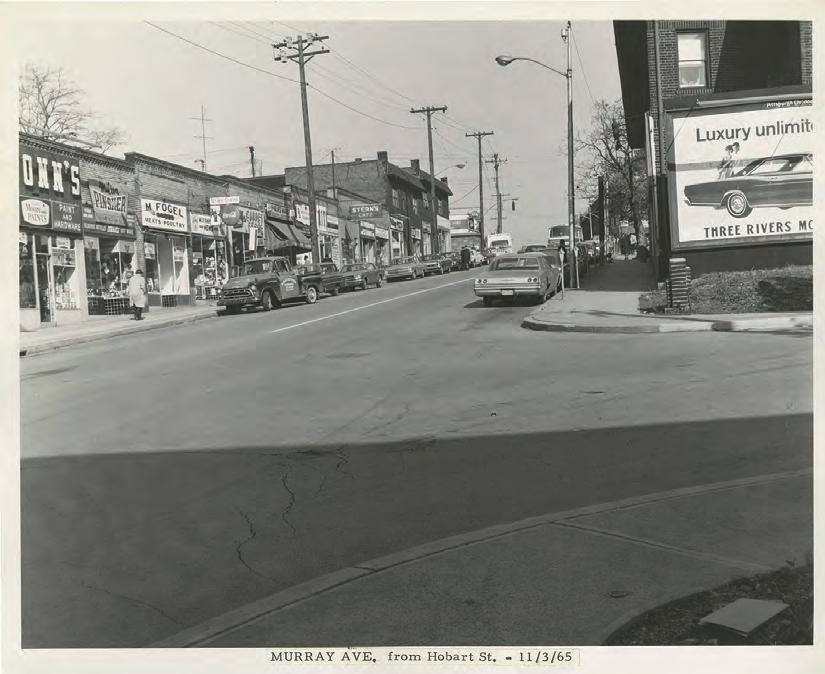
Afew Decembers ago, I overheard a customer at the Squirrel Hill Giant Eagle ask a clerk why the selection of Christmas decorations was so sparse. The clerk got an awkward look on his face as he searched for the most judicious way to explain the obvious. He finally told the customer, “The clientele at this branch is more ... Judaic.”
A similar scene happened at the same Giant Eagle, some 60 years earlier. A group of social workers visited the store to understand how it compared “to a similar market in a non-Jewish area.” They asked one of the non-Jewish clerks, who had also worked at Giant Eagle branches in other parts of the city. Here, she said, “They want catered to.”
Both moments have elements of ridiculousness — one arising from the ignorance of the customer, the other from the ignorance of the clerk. Of course, all customers “want catered.” It’s only noticeable if the thing they want is different from the thing you want.
Why were social workers wandering through a grocery store? In large part, to better understand these biases. They were firstyear graduate students at the University of Pittsburgh, part of an innovative new course called the Community Laboratory.
Professors Eleanor Cockerill and Claire Lustman developed the course to help emerging caseworkers confront their preconceptions of a new community. Students were assigned to neighborhoods all over the city. “In many ways they were like a group of travelers abroad who become increasingly absorbed with the characteristics of the country they are visiting, its people, its customs, its values,” Lustman later wrote.
Lustman was part of the local Jewish community, and Cockerill was personally familiar with it. She had offered lectures at the YM&WHA for returning veterans in the 1940s and sat on the board of the Council House in the early 1960s. In preparing the Squirrel Hill project, they convened 45 people who could help students navigate the local Jewish community. Students spent the fall of 1963 speaking to these experts and observing
someone else. The report abounds in the type of backhanded compliments that come when one group is actively wriggling free from the prejudices it holds toward another. After touring the business district — Weinstein’s, Arthur Moser, the Tweed Shop, Lintons, Maxine’s and, of course, a beauty salon — the students “concluded that the informants were cordial, helpful and available but in no way ‘pushy.’” I find it easy to feel superior when I read something like that, but it’s more helpful to use it as an opportunity to consider my own cluelessness toward other cultures.
The report makes clear that by late 1963, Squirrel Hill had a widely held reputation throughout the city as being an enclave belonging exclusively to rich Jews — a stereotype I’ve known existed but never seen so explicitly in the historic record. A social worker cannot provide adequate care if they are blinded by preconceptions, and so the Community Laboratory was designed to complicate stereotypes among the students.
And as the students gained trust, the Jewish community opened up, revealing facets of its identity. Explaining yourself to an outsider requires a fairly wide lens.
For example, when the students asked various respondents to describe the boundaries of Squirrel Hill, they got precise technical answers from politicians, postal workers and demographers. Jewish community leaders provided a much looser definition of the neighborhood. It included Greenfield, Point Breeze and even Monroeville.
Monroeville might seem like a stretch until you consider that 42% of the Jewish population of the eastern suburbs in 1963 had moved there directly from Squirrel Hill — twice as high as Jewish outmigration to the South Hills. These new residents of Churchill, Eastmont, Monroeville and Wilkins Township were young couples with parents in Squirrel Hill. They still regularly shopped on Murray Avenue. In many ways, the eastern suburbs were an extension of Squirrel Hill, rather than a replacement of it.
The report defines a crucial characteristic of Squirrel Hill, described as individual
East End Tot Shabbats
Spring into Shabbat with your tot at three Pittsburgh’s East End Synagogues
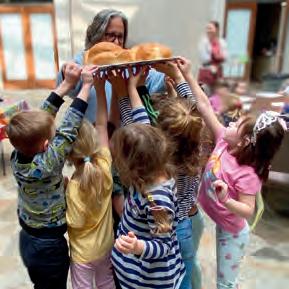
UPCOMING DATES:
FRIDAY, MARCH 1, 2024
FRIDAY, APRIL 5, 2024
FRIDAY, MAY 3, 2024

Shabbat With You
First Fridays of the Month at 4:30 p.m.
Families with young children are invited to join Cantor Toby Glaser and Family Center Director, Ellie Feibus for a pre-Shabbat playdate, service, and dinner to celebrate Shabbat together!
$5 per family RodefShalom.org/ShabbatWithYou

Shababababa
Second Fridays of the Month at 4:30 p.m.
Beth Shalom's musical service for Pittsburgh families with kids under age 8 led by Rabbi Seth Adelson. After the service, stay for a kidfriendly dinner and dessert.
$10 per child, $22 per adult and $48 per family. BethShalomPgh.org/Shababababa

UPCOMING DATES:
FRIDAY, MARCH 15, 2024
FRIDAY, APRIL 19, 2024
FRIDAY, MAY 17, 2024

UPCOMING DATES:
FRIDAY, MARCH 8, 2024
FRIDAY, APRIL 12, 2024
FRIDAY, MAY 10, 2024

Tot Shabbat
Third Fridays of the Month at 5:00 p.m.
Are you looking for an informal, inviting way to teach your little ones about Shabbat and connect with other families? Join Cantor David Reinwald, Rabbi Daniel Fellman, and Danie Oberman for this exciting service.
No charge; includes kid-friendly dinner. TempleSinaiPGH.org/TotShabbat
PITTSBURGHJEWISHCHRONICLE.ORG PITTSBURGH JEWISH CHRONICLE FEBRUARY 23, 2024 3
— HISTORY —
Please see Squirrel Hill, page 11
The 2000 block of Murray Avenue shows Pinsker’s, M. Fogel Meats, Murray News Stand, Stern’s Café, Kablin’s Market, and other shops — on Nov. 3, 1965. Photo courtesy of the Allegheny Conference on Community Development Photographs, Detre Library & Archives
Calendar
Submit calendar items on the Chronicle’s website, pittsburghjewishchronicle.org. Submissions also will be included in print. Events will run in the print edition beginning one month prior to the date as space allows. The deadline for submissions is Friday, noon.
q FRIDAY, FEB. 23
ZOA Pittsburgh is accepting applications for its Scholarship to Israel program from any local Jewish teen who will be a junior or senior in high school in September 2024 and is participating in a qualified, structured, study trip to Israel. Applicants will be judged on their involvement in Jewish organizations, volunteerism and an essay about Israel. Applications will be accepted through Feb. 29. For information and applications, contact ZOA Executive Director Stuart Pavilack at pittsburgh@zoa.org or 304-639-1758.
q SUNDAY, FEB. 25
Everyone has their own special recipe that they think is the best. Prove you have the winning recipe at Temple Sinai’s Kugel Cook Off. 10 a.m. templesinaipgh.org/ event/kugel-cook-off-sponsored-by-wots.html.
Join Chabad of the South Hills for a Tie-Dye Party Create awesome socks and compete in games. For grades 6-8. 4:30 p.m. $10. 1701 McFarland Road. chabadsh.com/cteenjr.
q SUNDAYS, FEB. 25–DEC. 29
Join a lay-led online parshah study group to discuss the week’s Torah portion. No Hebrew knowledge needed. The goal is to build community while deepening understanding of the text. 8:30 p.m. For more information, visit bethshalompgh.org.
q MONDAYS, FEB. 26–MAY 13
H. Arnold and Adrien B. Gefsky Community Scholar Rabbi Danny Schiff presents Torah 2. Understanding the Torah and what it asks of us is perhaps one of the most important things that a Jew can learn. In Torah 2, Schiff will explore the second half of Leviticus and all of Numbers and Deuteronomy. 9:30 a.m. $225. Zoom. jewishpgh.org/event/torah-2-2/2023-10-09.
q MONDAYS, FEB. 26–DEC. 28
Join Congregation Beth Shalom for a weekly Talmud study. 9:15 a.m. For more information, visit bethshalompgh.org.
q TUESDAYS, FEB. 27–MAY 14
Understanding and explaining Israel’s current position requires knowledge of history. In the 10-part course, A History of The Arab-Israel-Iran Conflict: All You Need to Know, Rabbi Danny Schiff will provide a full overview of the regional conflict that Israel has experienced over the last century. The cost of taking a course is never a barrier to participation. If price is an issue, please contact the organizer of this course so that we can make the cost comfortable for you. $145. 8 p.m. jewishpgh. org/series/history-of-the-arab-israel-iran-conflict.
q WEDNESDAY, FEB. 28
The 10.27 Healing Partnership and Emily Harris, experienced practitioner of Spirited Fun Improv,
will be offering “Improv in the Community,” a one-hour, once-a-week improv program aimed at older adults (but open to everyone). Participants will cultivate a supportive, lighthearted space where their creativity and connection will shine. 1 p.m. Squirrel Hill JCC, Room 316. 1027healingpartnership.org/event/improvin-community/2024-01-24.
q WEDNESDAYS, FEB. 28–MARCH 6
Chabad of the South Hills presents a new six-week course from the Rohr Jewish Learning Institute, Advice for Life: The Rebbe’s Advice for Leading a More Purposeful Life, a journey through the Rebbe’s practical wisdom on work, family, health and well-being. 7:30 p.m. Chabad of the South Hills, 1701 McFarland Road. chabadsh.com.
q WEDNESDAYS, FEB. 28; MARCH 20
Join the Squirrel Hill AARP for its monthly meeting. Refreshments will be provided. For further information, contact Marcia Kramer at 412-656-5903. 1 p.m. Rodef Shalom Congregation, Falk Library, 4905 Fifth Ave.
q WEDNESDAYS, FEB. 28–MAY 15
The Jewish Federation of Greater Pittsburgh virtually presents two Melton courses back-to-back: “Ethics” and Crossroads.” In “Ethics,” learn how Jewish teachings shed light on Jewish issues. “Crossroads” will present an emphasis on reclaiming the richness of Jewish history. 7 p.m. $300 for this 25-session series (book included). jewishpgh.org/series/melton-ethics-crossroads.
q WEDNESDAYS, FEB. 28–DEC. 18
Bring the parashah alive and make it personally relevant and meaningful with Rabbi Mark Goodman in this weekly Parashah Discussion: Life & Text. 12:15 p.m. For more information, visit bethshalompgh.org/life-text.
Temple Sinai’s Rabbi Daniel Fellman presents a weekly Parshat/Torah portion class on site and online. Call 412-421-9715 for more information and the Zoom link.
q THURSDAYS, FEB. 29; MARCH 14–28; APRIL 11-18
Join Rabbi Amy Bardack and Dor Hadash member Charlie White for a morning Shabbat service study, a nine-session, in-depth study of the structure and content of the siddur, with a focus on the prayers of Shabbat morning. 7:30 p.m. Free for members; $120 suggested donation for non-members. In-person with a virtual option. congregationdorhadash.shulcloud.com/event/ class-on-shabbat-morning-services.html.
q SATURDAY, MARCH 2
Join Congregation Beth Shalom for Sisterhood Shabbat. This year’s honorees are Shoshana Barnett, Tammy Hepps and Beth Jacobs. 9:30 a.m. Contact Helen Feder hrfeder@gmail.com
q SUNDAY, MARCH 3
Join Chabad of the South Hills for its annual Jewish Comedy Night, featuring comedian Chris Monty and opening act David Kaye. Enjoy hors d’oeuvres and an open bar. 7:30 p.m. Carnegie Stage, 25 W. Main St., Carnegie, 15106. $54/$45 early bird discount until Feb. 8. chabadsh.com/comedy.

q MONDAY, MARCH 4
Join Beth El Congregation of the South Hills as they welcome Richard Daffner for First Monday. Daffner will discuss the lives and times of some of the Bible’s bestknown villains and the background histories contributing to their actions and legacies of infamy. 11:30 a.m. To register, visit bethelcong.org/form/2024-firstmondays-march.html.
Experience “Perseverance,” the play that brought a powerful memoir of healing and renewal to the stage. Meet author Lee Kikel, playwright L.E. McCullough and director Art DeConciliis, with a post-show discussion about the play and the Holocaust. 7 p.m. $17-$27. 6 Allegheny Square East, 15212. primestage.com/event.
q MONDAYS, MARCH 4, 18; APRIL 1
Join the 10.27 Healing Partnership and practitioner Shawn Fertitta on the first and third Monday for Reiki-infused Sound Bathing. Immerse yourself in the soothing tones of crystal and Tibetan singing bowls. His experience is tailored to calm your mind, body and soul, promoting optimal healing. 10 a.m. South Hills JCC. 1027healingpartnership.org/reiki-infused-sound-bathing.
q THURSDAY, MARCH 7
Facilitated by local clergy from Jewish and Christian backgrounds, the Jewish Christian Dialogue is a monthly discussion that explores topics of similarities and differences. Noon. 4905 Fifth Ave. rodefshalom.org.
Want to learn about the “The 3 Keys to Achieving Financial Freedom Forever”? Jfunds is hosting a free masterclass with Shay Port, CPA and financial coach, where she will introduce a complete system for money management, including offering practical steps to implement so you can easily stay on track and accomplish your goals. Virtual event with advanced registration required. 7 p.m. Jfundspgh.org.
q THURSDAYS, MARCH 7–DEC. 5
Join Beth El Congregation of the South Hills for Hope & Healing on Zoom the first Thursday of each month, a 30-minute program led by Rabbi Amy Greenbaum. Chant, breathe, pray for healing and seek peace. Call Beth El at 412-561-1168 to receive the Zoom link. 5:30 p.m. bethelcong.org.
q SATURDAY, MARCH 9
Tree of life Congregation is happy to announce the premiere of The Torah Studio The first special guest is
Rector Jonathan Jensen of Calvary Episcopal Church. Jensen will engage with Rabbi Jeffrey Myers in a discussion of this week’s Torah portion. 9:45 a.m. 4905 Fifth Ave. treeoflifepgh.org.
q SATURDAY, MARCH 9
Join Tree of Life Congregation at Rodef Shalom Congregation to create your own tie-dye T-shirt for our “Woodstock” Purim shpiel. Bring your own clean white T-shirt or purchase one for $5. 4905 Fifth Ave. treeoflifepgh.org.
q THURSDAY, MARCH 14
Join the 10.27 Healing Partnership for a free Legal Appeals Process Educational Program focused on the next phase of the Pittsburgh synagogue shooter trial. Professor David Harris, from the University of Pittsburgh’s School of Law, will explain what appeals are and the function they serve, and what we should expect to see in the case moving forward. Free. 6-8 p.m. In-person or on Zoom. Room 202 of the Squirrel Hill JCC. Registration required at jewishpgh.org/event/legal-appeals-processeducational-program.
q SUNDAY, MARCH 17
Join the Jewish Studies at the University of Pittsburgh and Carnegie Mellon University for Mizrahi Music, Feminist Perspectives: An Afternoon of Performance and Discussion. The event will include contemporary performances of Mizrahi women’s music, as well as scholarly discussions of the diverse musical styles of Jewish women from the Middle East and North Africa. Join us for lunch, wonderful music and conversation. Noon. Frick Fine Arts Auditorium, 650 Schenley Drive, 15260.
q SATURDAY, MARCH 23
Join Tree of Life and Rodef Shalom and celebrate A Woodstock Purim. Purim fun will include a Purim service and shpiel with hamantashen immediately following. 7:30 p.m. 4905 Fifth Ave. treeoflifepgh.org.
q THURSDAYS, MARCH 28–APRIL 18
Bring your lunch and join Rabbi Jessica Locketz for Lunch Time Torah: Spring Holiday edition. Learn about the spring holidays — Purim and Passover. The March session will focus on Purim: its eclectic cast of characters, Hollywood-worthy plot and the diverse ways it is celebrated today. Offered in person and online. 1 p.m. 4905 Fifth Ave. $54 for non-members. rodefshalom.org/lunch. PJC
Join the Chronicle Book Club!
The Pittsburgh Jewish Chronicle invites you to join the Chronicle Book Club for its Feb. 25 discussion of “Tomorrow, and Tomorrow, and Tomorrow,” by Gabrielle Zevin. From Amazon.com: “Sam and Sadie — two college friends, often in love, but never lovers — become creative partners in a dazzling and intricately imagined world of video game design, where success brings them fame, joy, tragedy, duplicity, and, ultimately, a kind of immortality. It is a love story, but not one you have read before.”
Your Hosts:
Toby Tabachnick, editor of the Chronicle
David Rullo, Chronicle senior staff writer
How and When: We will meet on Zoom on Sunday, Feb. 25, at noon.
What To Do
Buy: “Tomorrow, and Tomorrow, and Tomorrow.” It is available at area Barnes & Noble stores and from online retailers, including Amazon and Barnes & Noble. It is also available through the Carnegie Library system.
Email: Contact us at drullo@pittsburgh
jewishchronicle.org, and write “Chronicle Book Club” in the subject line. We will send you a Zoom link for the discussion meeting. Registration closes on Feb. 22.
Happy reading! PJC
— Toby Tabachnick
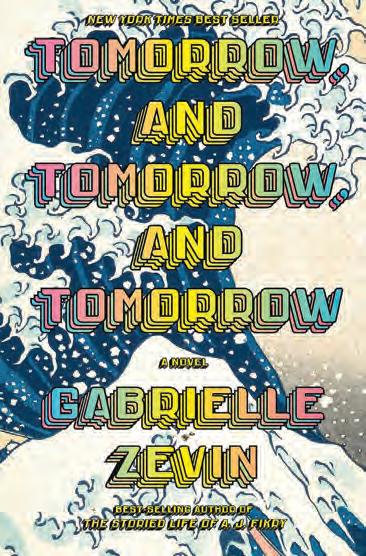
4 FEBRUARY 23, 2024 PITTSBURGH JEWISH CHRONICLE PITTSBURGHJEWISHCHRONICLE.ORG
Headlines
Aliyah applications from Western countries surge since Oct. 7
Israel expects a wave of immigration in the wake of the war against Hamas, fueled by solidarity with the Jewish state and antisemitism rising worldwide, the minister of aliyah and integration said on Feb. 14, JNS.org reported.
Some 6,500 people have immigrated to Israel since the Oct. 7 massacre, and there has been a significant increase in aliyah applicants from Western countries, including France, Canada, the United States and the United Kingdom.
“There are those who sought to uproot us from our land and they will see aliyah,” Minister of Aliyah and Integration Ofir Sofer said. “At the end of the day, Israel is the national homeland of the Jewish people.”
Since the start of the war, there has been a 300% increase in aliyah applications from France, a 150% jump from Canada, a 100% rise from the United States and a 40% increase from the United Kingdom.
Among the more than 6,000 new immigrants, or olim, since the outbreak of the war are youths who came to serve in the IDF and parents of slain soldiers.
Top European rights court upholds Belgian ban on kosher slaughter
The top rights court in Europe has ruled that bans of ritual slaughter in parts of Belgium can stand, ending the hopes of Jewish advocates who had said the bans were an unfair infringement on Jewish practice, JTA.org reported.
Two of Belgium’s three regions banned
slaughter without stunning in 2017 and 2018, saying that the practice was cruel to animals. Stunning before slaughter is barred in both shechitah, Jewish ritual slaughter, and zabiha, the Muslim method of slaughtering animals for food.
The Court of the European Union dealt Jewish community leaders a major defeat by upholding the bans in 2021. Israel’s ambassador to Belgium called the ruling “catastrophic and a blow to Jewish life in Europe.”
The European Court of Human Rights, which is not affiliated with the EU, upheld the bans in a ruling that closely comports with the 2021 EU ruling.
“The protection of animal welfare constitutes an ethical value to which contemporary democratic societies attach increasing importance and that should be taken into account when assessing restrictions placed on the external manifestation of religious convictions,” the court’s seven judges wrote in their opinion, which was published in French.
Left-wing Zionist groups Americans for Peace Now and Ameinu to merge
Two decades-old left-wing pro-Israel groups, Americans for Peace Now and Ameinu, are poised to merge — a consolidation of voices in the liberal Zionist camp amid Israel’s war with Hamas, JTA.org reported.
The presidents of the two small nonprofits — Americans for Peace Now’s Hadar Susskind and Ameinu’s Ken Bob — said the merger made sense because the groups complemented one another: APN works advocacy in Washington and maintains ties with the Israeli
Today in Israeli History
Feb. 26, 1973 — Kissinger, Egypt’s Ismail secretly meet

p
was the first of (so far) 10 Israeli films nominated for the foreign language Oscar.
Feb. 23, 1965 — ‘Sallah Shabbati’ is nominated for Oscar

The Israeli movie industry has its first Oscar nominee when “Sallah Shabbati” is nominated for best foreign language film. The film loses the Academy Award but wins a pair of Golden Globes, including one for star Topol.
Feb. 24, 1942 — Soviet sub sinks Struma
Thinking it is an enemy ship, a Soviet submarine sinks the refugee transport SS Struma in the Black Sea. Only one of the 769 Jewish refugees survives. The British had denied them visas to Palestine.
Feb. 25, 1994 — Goldstein
massacres Muslims in Hebron Kach party member Baruch Goldstein fatally shoots 30 Muslims worshipping at the Mosque of Abraham in Hebron’s Cave of Machpelah and wounds 125 others before being beaten to death.
In Armonk, New York, Egyptian National Security Adviser Hafez Ismail tells his U.S. counterpart, Henry Kissinger, that Egypt is willing to negotiate directly with Israel under
Feb. 27, 1928 — Ariel Sharon is born
Ariel Sharon, Israel’s 11th prime minister, is born in K’far Malal. He serves in the army from the War of Independence t hrough the Yom Kippur War and oversees the first war in Lebanon as defense minister.
Feb. 28, 1955 — Paratroopers raid Gaza
Approximately 50 Israeli paratroopers strike an Egyptian military camp in Gaza as a reprisal for repeated Arab attacks against Israeli civilians. Eight Israeli soldiers and 39 Egyptians are killed in Operation Black Arrow.
Feb. 29, 1948 — Lehi bombs
Cairo-Haifa train
Lehi militants use mines to bomb train cars carrying British troops on the Cairo-Haifa rail line north of Rehovot, killing at least 27 soldiers. Lehi says the attack is retaliation for a bombing that killed 58 Jewish civilians in Jerusalem. PJC
peace movement, while Ameinu, Hebrew for “our people,” liaises with the broader left in the United States and engages more closely with national Jewish groups.
“The emphasis and the focus is really going to continue to be Israel, Israel-Palestine and peace,” Susskind said. “But it’s also going to be a broader agenda than what was APN’s work.”
Israeli tourism remains in state of collapse amid war
The Gaza war continues to take its toll on Israel’s tourism industry, with the country seeing only 58,600 tourist visits in January, compared to the 257,400 tourists who visited during the same month last year, marking a 77% decrease, JNS.org reported.
According to monthly figures released by Israel’s Central Bureau of Statistics, only 500 single-day visits were registered, compared to 14,000 in January 2023, a 96% decrease.
Also, far fewer Israelis are traveling abroad. In January, 281,400 Israelis traveled to other countries, down from 611,100 in January 2023, a decrease of more than 50%.
Last month, CBS released annual tourism numbers for 2023, which dropped off sharply toward the end of the year; the war broke out during the busiest tourism quarter of the year, which includes the Christmas holidays.
Only 3 million tourists came in 2023, compared to the 4 million predicted. In 2019, Israel enjoyed a record-breaking year with 4.5 million tourists.
Following the outbreak of the war, most international airlines suspended flights to Israel, and the majority have yet to restore service.
Ancient Roman military base uncovered in Israel
Archaeologists have uncovered the remains of a Roman legionary base in northern Israel dating back 1,800 years, the Israel Antiquities Authority announced on Feb. 14, JNS.org reported.
The excavation, at the foot of Tel Megiddo, sheds light on the military presence and infrastructure of the Legio VI Ferrata (Iron Legion), according to the IAA.
Tel Megiddo, also known simply as Megiddo, occupies a strategic position overlooking the Jezreel Valley, a key crossroads of ancient trade routes connecting Egypt and Mesopotamia. Its history spans thousands of years, making Tel Megiddo one of the most extensively excavated sites in the region.
Among the discoveries are sections of the Via Pretoria, the camp’s main road, as well as a semicircular-shaped podium and stone-paved areas that formed part of a large public building. According to the IAA, the sheer scale of the base — measuring 550 meters (1,805 feet) long and 350 meters (1,148 feet) wide — makes it a unique find in the region.
“While Roman military camps are known in Israel, they are temporary siege camps, or small camps belonging to auxiliary divisions,” said excavation director Yotam Tepper. “None compares with the entire complex of the legionary base, as has been uncovered in the archaeological excavations at Legio, next to the Megiddo Junction.” PJC
— Compiled by Andy Gotlieb


PITTSBURGHJEWISHCHRONICLE.ORG PITTSBURGH JEWISH CHRONICLE FEBRUARY 23, 2024 5
— ISRAEL —
Items are provided by the Center for Israel Education (israeled.org), where you can find more details.
— WORLD — We Prepare Trays for All Occasions HOMEMADE SALADS & SOUPS CATERING SPECIALISTS DELI PARTY TRAYS DELICIOUS FRIED CHICKEN UNDER THE SUPERVISION OF VAAD OF PITTSBURGH WE RESERVE THE RIGHT TO LIMIT QUANTITIES. SPRING VALLEY POTATO PUFFS $5.99 EA HAOLAM SL GOUDA $4.89 6 OZ LIEBER'S COAT'N BAKE $1.79 EA ORIEL CRÈME MALABI $6.19 EA EMPIRE TURKEY BACON $4.69 EA BABA GANOUSH $7.99 LB KALAMATA OLIVES $6.69 LB EMPIRE CLASSIC TURKEY BREAST $10.99 LB WINE SPECIALS HOURS BINYAMINA YOGEV WINES $17.99 750 ML JOYVIN RED OR WHITE WINE $9.79 750 ML GROCERY DELI COOKED FOODS TOMATO RICE SOUP $9.99 QT KASHA KNISH $2.59 EA STUFFED CHICKEN BREAST $12.99 LB LENTIL SALAD $4.99 LB MEAT GROUND TURKEY $6.29 LB CHUCK ROAST $13 59 LB CHUCK STEAK $13.79 LB STORE HOURS Sun. • 8 a.m. - 6 p.m. Mon.-Wed.• 8 a.m. - 6 p.m. Thurs. • 8 a.m. - 8 p.m. Fri. • 8 a.m. - 3 p.m. Bring Them Home Now p Ariel Sharon visits the Suez Canal in 1982. By Moshe Milner, Israeli Government Press Office, CC BY-SA 3.0
“Sallah Shabbati”

Event Planning


As a professional event producer, people often seek my support to help their special day stand out. My approach to designing a personalized and custom event is through what I call “event branding.”
While many people associate branding with corporate marketing, it’s a strategy that can be applied to social events as well.
Branding is all about creating a visual identity and experience that’s a reflection of a person or organization’s interests and values. When it comes to events, it’s a way to represent who an event is for and add deeper meaning and purpose. An event’s brand also can inform a range of planning choices, including venue, design and decor style.
Here are some ways to incorporate event branding.
Finding inspiration: Developing an event brand requires thoughtful consideration. Start by thinking about what feels personal, attractive and engaging. If
you need additional ideas, think about experiences and visuals that may stand out to you from traveling, dining or shopping. Browsing magazines, newspapers or websites also can spark creativity.
Opting for a theme: A tried-and-true way I personalize events like mitzvah celebrations is with a theme, which can be inspired by someone’s interests, hobbies or favorite things. This allows for more flexibility than just a single activity or point of intrigue. A theme also can be carried out through visual references woven into the event experience in several ways. For example, a baseball theme can incorporate a custom photo booth or selfie station with a graphic of the interior of the team locker room or ball field. A snow ski theme can have an après ski bar with assorted hot beverages.
Referencing social media: Using social media sites such as Instagram and Pinterest can be helpful tools for visual references while curating a vision for your event, especially when working with a professional event producer. For some people, striving to explain their ideas can be challenging, so showing pictures of what they have in mind,
their likes and dislikes can make the process easier. I encourage my clients to select and share with me images that I can use as references. Remember, though: Just because you see something on social media doesn’t necessarily mean it will work the same way for every venue or event scenario. Figuring out how to adapt and bring to life something spotted on social media can be quite involved and often requires the support of a professional.
Putting it all together: Once a vision for the event has been determined, there are many things to consider when figuring out what will be best for your event. Branding is, quite literally, a way to make your mark on your event. For example, inspirations found online or in real life can be used as the basis for picking color palettes, a custom logo and graphics — all of which can be sprinkled throughout an event and show up on bars, the dance floor, printed materials, gift bags and more. Linens, balloons, flowers and furniture in colors and textures that align with the theme are more ways to brand the event. For example, a great custom addition to a lounge area can include throw pillows printed with the event logo.
Distinguishing fantasy from reality: Before moving full-steam ahead, pause to make sure
the event branding plan is possible. For instance, will it work for the desired venue? If the vision is to hang something from the ceiling, is that permitted in the space? Do you know a professional who can help make sure there are rigging points or identify a structure from where items can be safely hung overhead? Is the theme functional? Sometimes, what’s posted online is from styled photo shoots, meaning that a perfect-looking party on Pinterest may have been set up purely for a photograph. Also, what will all the different elements to brand an event cost? A professional event planner and designer can help break down and explain the expenses involved with branding an event to make sure all of the elements stay within the budget.
While it may seem intimidating at first, branding an event is what will help to make it distinct and memorable for years to come and will leave a lasting impression on guests — long after the last dance or Champagne toast. PJC
Shari Zatman is a professional event planner, designer and consultant with close to 25 years of event industry experience. Perfectly Planned by Shari focuses on luxury events such as parties, mitzvahs, weddings, corporate and nonprofit events. perfectlyplannedbyshari.com






6 FEBRUARY 23, 2024 PITTSBURGH JEWISH CHRONICLE PITTSBURGHJEWISHCHRONICLE.ORG Event branding is key to unlocking a one-of-a-kind party Laura’s Floral Boutique LAURA M. FEDORKO Certified Master Designer (412) 373-1800 • LAURASFLORALBOUTIQUE@GMAIL.COM Phipps conservatory Oakwood photo For unique event furnishings... Vintagealleypgh@gmail.com • 412-215-3918
A branded dance floor was inspired by the couple’s wedding invitation.
Photo by Rhaina Taylor Photography
Guest Columnist Shari Zatman
Event Planning Wedding invitations trend to the personal in 2024
By David Rullo | Senior Sta Writer
Bows, vibrant colors, floral patterns, modern versus classic typography — a couple planning a wedding has a lot to consider when choosing their invitations.
According to the nuptial website The Knot, most of the major trends in this year’s wedding invitations lean toward the personal and away from those formal white cards with gold, cursive print requesting your presence at an affair at such-and-such place.
Interested in sending out invites that look like the Queen of Dandelions is marrying the Dark Gnome in the home of the crystal orb? How about a laser-cut recreation of a vinyl album, complete with an inner sleeve? It seems as if the only limitations are your imagination and pocketbook.
Yvonne Stein from Invitations Plus on South Negley Avenue noted that much has changed in the modern design of invitations.
“A lot of people prefer heavier card stock,” she said. “There have also been some people that have liked acrylic invitations.”
A quick search online shows that transparent acrylic, or plastic, cards with gold or white writing are a popular choice now. These custom design cards can be paired

with paper of any color, allowing the wedding couple to express their individual personalities.
Laser-cut wedding invitations, Stein said, are also popular.
The designs that can be accomplished with this technique have no shortage of possibilities, including art deco gates that open to a card with lush green garden



designs, or ivory patterns imitating hand-cut designs, and even geometric patterns or motifs made to look like the linens used at a reception. Add a colorful ribbon tied in a bow and your invitation will have a completely modern look.
Stein said that many are also using a letterpress process with heavier paper, instead of simply printing digitally or through thermography.
She does not recommend bypassing local stores and vendors to buy invitations online. The possibility of saving money is tempting, but it doesn’t always work out.
Stein said that, in the past, couples have come to her with invitations they bought online unaware of the weight of the card stock, only to receive a thin card not worth the savings. She has worked to attach thicker paper to shore up the invites.
The advantage to working with someone local, she said, is the ability to feel the paper and choose the design.
Local artist Joan Rothaus agrees.
The South Hills businesswoman spent years serving as a middle person, going to various conventions and wedding shows, making sure she was aware of the newest trends.
One of the advantages Rothaus offered was the ability to custom design invitations found at the various trade shows. She is a master calligrapher and can create designs
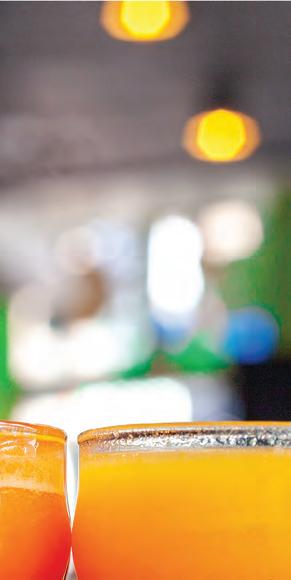




not reliant on printers.
“I used to help people change the design of the invitation making it their own design, which I would then send to a company to print,” she said.
Rothaus said that while many people buy their wedding invitations online, that often leaves them disappointed.
Evites, she said, are a trend but not necessarily the right one.
“It’s not the same as going to look through a beautiful book at beautiful invitations and feeling the paper and seeing them engraved and getting to know the difference between each,” Rothaus said.
While neither Rothaus nor Stein are proponents of internet shopping, Stein said there is one new trend she is seeing more and more: creating websites and printing wedding URLs on invitations.
“They are putting the wedding URL on the invitation where they have information for out-of-towners,” she said. “Some people prefer to have the RSVP online.”
In 2024, the look and feel of an invitation is an open question for the bride and groom to answer. Using a local store or businessperson will help ensure the soon-to-be-wed couple aren’t surprised by the invites their guests will receive. PJC
David Rullo can be reached at drullo@ pittsburghjewishchronicle.org.

PITTSBURGHJEWISHCHRONICLE.ORG PITTSBURGH JEWISH CHRONICLE FEBRUARY 23, 2024 7
—
— WEDDINGS
Photo by pexels-chandy-bonatto
Event Planning
Nothing Bundt Cakes in East Liberty gets kosher certification
across the U.S. — but only one of about 20 nationwide that are certified kosher, Palashoff said.
By Justin Vellucci | Special to the Chronicle
Interested in sampling an 8-inch carrot bundt cake?
Curious to try a “bundtlet” — perhaps the baker’s equivalent of a personal pan pizza – in lemon? Or snickerdoodle? Or white chocolate raspberry?
How about 12 mini “bundtinis” made with Reese’s-brand chocolate peanut butter and topped with cream cheese frosting?
If these sound appealing, you might want to meet Jennifer Palashoff.
The South Hills resident and mother of three is celebrating the grand opening of her new Nothing Bundt Cakes franchise in East Liberty — and the bakery already was certified kosher by the Vaad Harabonim of Greater Pittsburgh.
The storefront at 5824 Penn Ave. is one of about 500 Nothing Bundt Cakes franchises
Getting the certification requires community involvement and “that’s what we wanted to do,” she added.
“I’m an entrepreneur at heart and I believe in Nothing Bundt Cakes’ mission,” which includes empowering women, Palashoff said. “They truly believe in bringing joy to the community and their guests.”
“I love this city and I love the urban community,” she added.
Palashoff said she met with Pittsburgh-area rabbis in late January so they could take a closer look at the inner workings of her bakery and run through lists of the cakes’ ingredients.
Though Palashoff is not Jewish and, therefore, does not keep kosher, she “wanted to be able to bring joy to everyone in our community,” she said.
Nothing Bundt Cakes joins eateries like Milky Way and Café Eighteen, local




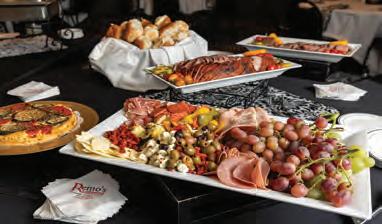

businesses such as The Pop Cakery LLC and Pigeon Bagels, and caterers including Elegant Edge and Shabbox on the Vaad’s list of Pittsburgh operations that have been vetted and verified as kosher.
Palashoff said she plans to frame and post her kosher certification and hechsher markings from the Vaad Harobonim in the front of the East Liberty shop, which is located in the center of the neighborhood’s business district.
The Nothing Bundt Cakes story started in Las Vegas in 1997.
There in Nevada, founders Dena Tripp and Debbie Schwetz — one of them good with the cake, the other good with frosting, Palashoff quipped — started the business in their home kitchens. Since then, it has grown to more than 500 locations in more than 40 U.S. states and Canada.
Today, Nothing Bundt Cakes bills itself as the largest specialty cake company in America.
This week — from Feb. 20 to 24 — Palashoff’s East Liberty location will mark a weeklong grand opening with “community days” discounts to school staff members, health care workers, military personnel and more, she said. On Friday, Feb. 23, 20% of all s ales will be donated to the East End Cooperative Ministry.
The bakery’s cakes include dairy ingredients, so they are deemed “cholov stam,” Vaad Harabonim officials said on the group’s website. The Vaad’s website also states that the

bakery’s bread is not “Pas Yisroel.”
Cholov stam refers to milk that “was not supervised by a mashgiach, but is assumed to be pure based on other considerations,” according to the O-U kosher certification service. Pas Yisroel refers to bread that was baked with specific Jewish involvement. PJC
Justin Vellucci is a freelance writer living in Pittsburgh.

8 FEBRUARY 23, 2024 PITTSBURGH JEWISH CHRONICLE PITTSBURGHJEWISHCHRONICLE.ORG
Corporate, Weddings, Bar/Bat Mitzvahs, Showers, Graduations, Shivas & BBQ Specialist! Remo’s Catering offers Full Bar Service • Kosher options upon request Call Us: 412-822-7844 • Remoscatering.com
Unforgettable flavors for an unforgettable event. ELEGANT EDGE Modern cuisine for a simcha to remember. 412.385.2332 eedgecatering.com CERTIFIED KOSHER Unforgettable flavors for an unforgettable event. ELEGANT EDGE Modern cuisine for a simcha to remember. 412.385.2332 eedgecatering.com CERTIFIED KOSHER 5885 Forbes Avenue • Squirrel Hill, PA 15217 phone #: 412-521-8100 DELICATESSEN You haven’t had a bagel until you’ve had one om the BAGEL FACTORY…. Every Tuesday buy 6 bagels get 6 FREE! Don’t forget to pre-order the Famous Corned Beef & Pastrami sandwiches made in-house― Voted Best Rachel & Reuben bagel factory and delicatessen — LOCAL —
p A Bundt cake creation at Nothing Bundt Cakes Photo courtesy of Jennifer Palashoff
Event Planning
When the situation calls for something bubbly, here’s what to serve
Uriel
If you came to my house and asked me to open my refrigerator, you would typically see some kind of sparkling wine/Champagne.
Why is that, you ask?

secondary fermentation takes place in large tanks rather than individual bottles.

Well, what does sparkling wine/ Champagne make you think of? Celebration!
Is there ever a reason to not open up a bottle of bubbly?
I am often asked how sparkling wine/ Champagne became a symbol of celebration.
Champagne became a symbol of celebration due to a combination of historical, cultural and marketing factors. The association between Champagne and celebrations can be traced to the 17th century in the Champagne region of France, where the unique sparkling wine gained popularity among the French aristocracy. Over time, Champagne became synonymous with luxury, opulence and special occasions, such as royal gatherings, weddings and important milestones.
The effervescence and distinctive taste of Champagne, along with its association with important events, led to its adoption as the quintessential drink for celebrations.
Additionally, the marketing efforts of Champagne producers and the association of Champagne with prestigious events, such as New Year’s Eve and other festivities, further solidified its status as a symbol of celebration. The sound of a popped Champagne cork and the visual spectacle of the bubbles also contribute to the festive atmosphere.
Sparkling wine/Champagne continues to be closely linked with joyous occasions, marking achievements and commemorating significant moments in people’s lives.
Champagne, cava, and prosecco are all types of sparkling wines, but they originate from different regions and are made using different methods, which impart distinct flavors and characteristics to each.
Here’s how they differ.
Sparkling wine: Sparkling wine is a broad category that encompasses any wine with significant levels of carbon dioxide, making it fizzy. It can be produced in various regions around the world, using different methods. While Champagne is a type of sparkling wine, not all sparkling wines are Champagne. Other sparkling wines may be made using methods like the Charmat method, where the
Champagne: Champagne is a sparkling wine produced exclusively in the Champagne region of France. It is made using the traditional method (also known as méthode champenoise or méthode traditionnelle), where the secondary fermentation that produces the bubbles occurs in the bottle. Champagne is typically made from chardonnay, pinot noir and pinot meunier grapes. It tends to be elegant and complex and often has notes of citrus, toast and yeast.
Cava: Cava is a sparkling wine produced primarily in the Catalonia region of Spain.
It is made using the traditional method, similar to Champagne, with the secondary fermentation occurring in the bottle.
Cava is typically made from indigenous Spanish grape varieties such as Macabeo, Parellada, and Xarel·lo. It tends to be more affordable than Champagne but can offer excellent quality with fruity, floral, and sometimes nutty flavors.
Prosecco: Prosecco is an Italian sparkling wine primarily produced in the Veneto and Friuli Venezia Giulia regions of Italy. It is made using the Charmat method, where the secondary fermentation occurs in large tanks. Prosecco is typically made from the Glera grape variety, although some versions may include small amounts of other grapes. It is known for its light, fruity flavors, often featuring notes of apple, pear, and floral aromas.
While Champagne, cava, prosecco and other sparkling wines share the effervescence that makes them refreshing and celebratory, they vary in origin, production methods, grape varieties used and flavor profiles.
Here are a few suggestions that you can buy locally:
Ma Maison Champagne , France, (mevushal), $11.99: Lighter-style wine, easy drinking.
Drappier Carte D’Or, France, (mevushal), $65.99: Great aroma with a complex mouthfeel (I really like this Champagne).
Binah Blanc De Blanc Sparkling Wine, Allentown, Pennsylvania, (non-mevushal), $41.99: Yep, this kosher wine is made in Allentown. An old school sparkling wine with great flavors and very well-balanced.
Bartenura Prosecco Brut, Italy (mevushal), $22.99 A slightly fruity, slightly bubbly wine that goes great as an aperitif. PJC
Uriel Marcovitz is a former restaurateur in Pittsburgh. He studies wine with the Court of Master Sommelier and holds advanced-level sommelier status.






PITTSBURGHJEWISHCHRONICLE.ORG PITTSBURGH JEWISH CHRONICLE FEBRUARY 23, 2024 9
A Pi sburgh New York Style Deli Tradition never tasted so good! 194 Craig St., Pittsburgh, PA 15213 Phone: 412-682-5033 • Fax: 412-682-5503 • foodforthoughtdeli.com Tuesday – Sunday: 9am – 4pm • Catering available every day “Food for ought Deli has catered hundreds of events in and around the Pittsburgh area, from Corporate to Private Parties. Let us cater your special event from beginning to end! We look forward to serving you!" – Bob “The Deli King” Wasserman, Owner For all your cateringoccasion Mitzvahs,needs! Shivas, Weddings... With unique indoor & outdoor space and on-site catering, the Hotel Indigo Pittsburgh University Oakland is perfect for your next event. 329 Technology Drive | Pittsburgh, PA 15219 412-297-4098 www.hotelindigo.com/pittsburghuni
Columnist
Guest
Marcovitz
Event Planning
By Family Features
Awedding day is filled with symbolic tradition, from varied religious customs to the never-ending circle reflected in the rings and the types of flowers accentuating the celebration. Even with all the traditional rituals to consider, nearly every bride and groom can find ways to give their special day some unique touches that reflect their personality and love.
Music sets the mood for every wedding, and it’s an easy place to put your own spin on the celebration. Let guests know this isn’t your average wedding by setting the festivities against a soundtrack that lets your true character shine.

Photography is an essential element of your big day, but think beyond the images you’ll capture throughout the wedding and reception. Photos lend a personal touch, no matter what your color scheme or theme. Integrate photos of the two of you at various stages of life, together as a couple and with loved ones (perhaps even some you’re honoring in memoriam). You can display these at a table with the guest book, as part of the table centerpieces,




or even on the gift table. Or take things digital and load all your images into a
slide show set to music.
Make favors meaningful. Forgo more common items like bubbles and chocolate, and instead send a little of yourself home with your guests. Maybe it’s a memento from a place with special meaning to you both, or a bottle opener shaped like a bicycle to represent the way you met. Just think about the moments and things that define you as a couple and do some searching online. You’ll probably be surprised by how quickly the options pile up.
Serve a menu that shows guests more about your life together. Your loved ones can order basic beef or chicken anywhere. Instead, give them a glimpse into you. Make your main course the same food you enjoyed on your first date or during another monumental moment in your courtship. Or plan the entire menu around a region that you hold close to your heart.
Weddings are filled with traditions, but that doesn’t mean you can’t put your own touches on the day for a special event filled with memories that are uniquely your own. Find more advice for life’s special moments at elivingtoday.com. PJC

















10 FEBRUARY 23, 2024 PITTSBURGH JEWISH CHRONICLE PITTSBURGHJEWISHCHRONICLE.ORG
WEDDINGS —
—
the right officiant is an important decision. Your ceremony should be as unique and personal as you and your partner. Combining a personal touch with a feeling of
Choosing
the right officiant is an
RANKED ONE OF THE KNOT’S
Choosing
RANKED ONE OF THE KNOT’S TOP OFFICIANTS
Ken Eisner, Attorney for 39 Years Call 412-414-1533
the right officiant is an important decision. Your ceremony should be as unique and personal as you and your partner. Combining a personal touch with a feeling of warmth and wit, your friends and family will gain a deeper appreciation of what a wonderful couple you are.
KenIMarryYouHOL23_6.qxp_Layout 1 10/16/23 5:40 PM Pag
Choosing
Years www.kenimarryyou.com warmth and wit, your friends and Choosing the right officiant is an important decision. Your ceremony should be as unique and personal as you and your partner. Combining a personal touch with a feeling of warmth and wit, your friends and family will gain a deeper appreciation of what a wonderful couple you are. RANKED ONE OF THE KNOT’S TOP OFFICIANTS Ken Eisner, Attorney for 39 Years Call 412-414-1533 or email keisner@kenimarryyou.com for a Meet and Greet Choosing the right o ciant is an important decision. Your ceremony should be as unique and personal as you and your partner. Combining a personal touch with a feeling of warmth and wit, your friends and family will gain a deeper appreciation of what a wonderful couple you are. RANKED ONE OF THE KNOT’S TOP OFFICIANTS Choosing the right officiant is an RANKED ONE OF THE KNOT’S TOP OFFICIANTS KenIMarryYouHOL23_6.qxp_Layout 1 10/16/23 5:40 PM Pag (412)844-2115 Pittsburgh,PA15206 5824PennAvenue Pittsburgh-EastLiberty EventChron 08/31/2024 NothingBundtCakes.com Put more you into your wedding day Photo courtesy of Getty Images Weddings are filled with traditions, but that doesn’t mean you can’t put your own touches on the day for a special event filled with memories that are uniquely your own. www.pittsburghjewishchronicle.org
RANKED ONE OF THE KNOT’S
Headlines
Beer:
Continued from page 1
Typically bars, or venues with rows of televisions, don’t work, she said.
“Some people have the wrong idea of what a brewery is,” she said, noting they don’t resemble the typical corner pub. Instead, they are for those, like her, who have an interest in trying locally brewed craft beer.
In fact, many local breweries offer more than the usual beer and conversation.
Like Two Frays Brewing and its “Thinker and Drinkers” series, Acclamation Brewing has a regular series of speakers.
If the connection between the Jewish community, breweries and the Holocaust seems odd, it shouldn’t.
Jews have had a long history of brewing beer — including helping to found Oktoberfest, the perennial celebration of all things hops, according to Tablet Magazine.
And while Jews were forbidden from brewing beer for centuries in Germany, in 1868 the country introduced its freedomof-trade laws, giving equal status to the Jewish community. In the following years, Jews bought several breweries, updating and modernizing the industry.
It was Jakob von Hirsch, a protected Jew in Germany, who created the country’s first industrial brewery in 1836. It was eventually seized by the Nazis who used it for medical storage and as an air raid bunker.
Gibson:
Continued from page 1
code, were the reason for an action against you, you can come to the commission, which will take the complaint as investigators, will talk to both sides and make a recommendation to the commissioners.”
If probable cause is found, a mandatory meeting with the parties will be scheduled. That session, which closely resembles a mediation, is used to enable the parties to reach a mutual resolution; if an agreement cannot be made, a public hearing will be held.
Gibson, who retired from Temple Sinai in 2020 after a 32-year run as its spiritual leader, began volunteering with the commission two years ago and serves on its compliance review section.
The CRS sub-commission reviews recommendations from commission staffers and determines whether a complaint moves forward or is set aside for lack of evidence.
“It is extremely rare that I would disagree with the findings of the investigators because they do a really good job,” Gibson said.
Squirrel Hill:
Continued from page 3
independence within a “loosely bound” power structure. Squirrel Hill was widely considered to be the most politically independent section of Pittsburgh in those years. It famously split tickets in many local elections and regularly flip-flopped between parties from election to election. Politicians understood that Squirrel Hill voted on issues, and even Jewish
Löwenbräu, one of Germany’s largest and most successful breweries was founded sometime in the 14th century, but it was when the company’s Jewish chairman, Moritz Guggenheimer, took advantage of the country’s new international railroad network and transport routes that it was transformed into Munich’s largest export brewery. Like all Jewish businesses, it was seized by the Germans during the Nazis’ reign.
still exist with Stars of David painted on the side.
And there’s evidence that fermented beverages, a precursor to beer, were found in caves near Haifa dating back nearly 13,000 years.
“There’s a lot of connection to beer in Europe, which is pretty cool,” Stueber said.
Holocaust Center of Pittsburgh Operations Manager Christina Sahovey said
Jews have had a long history of brewing beer — including helping to found Oktoberfest, the perennial celebration of all things hops, according to Tablet Magazine.
The Jewish connection to brewing isn’t strictly found in Germany.
In 1935, Hermann Schülein fled to New York and became the director of Rheingold Brewery. At its peak, it had the distinction of being New York’s most popular beer and the official beer of the New York Mets.
Stueber said it wasn’t only brewing that connected the Jewish community to beer, noting that Jews invented decorated beer steins; in fact, some pre-Holocaust steins
Gibson remains active with the group, he said, because he considers it “a civic responsibility. There are city commissions that only work if citizens step forward and serve on these panels and commissions.”
that Stueber is a prolific speaker who has shared her story with thousands of people in libraries, schools, churches and synagogues. It’s been “pretty cool,” Sahovey said, to see Stueber recount her parents’ journey in breweries, which offer a more laid-back and relaxing atmosphere.
It also fulfills one of Sahovey’s often spoken mantras: “Meet people where they are.”
By talking in breweries, she said, Stueber helps to show the Holocaust Center does
in these discussions about the complaints that are brought to the commission,” he said.
Gibson said his fellow volunteers know about his faith, retirement and earlier professional duties.
“I’ve done a great deal of work in the interracial community, interfaith community, social justice community. And this is simply another way of advancing the ideals that the city has enshrined in its code.”
― RABBI JAMES GIBSON
Gibson credited the nearly 15-person assembly with having a diverse volunteer pool.
“There are people from different neighborhoods, people of different ethnicities — some are kind of well-to-do and others not so much — but they all get an equal voice
candidates were never guaranteed political support in the neighborhood.
The report describes a political structure where community groups emerged quickly in response to issues, worked hard to achieve their goals, and disbanded. Women were a le ading force behind this community advocacy, especially homemakers who h ad the time and the smarts required to investigate issues and organize communal responses.
Brought to bear on community issues,
“The interesting aspect of this has been that there are times when either a complainant or respondent is somebody in the Jewish community that I know,” he said. In those instances, “I immediately recuse myself from having any vote whatsoever as to what the outcome is going to be in that case.”
the Jewish population of Squirrel Hill often appeared to be fragmented across many initiatives and yet still managed to come together to address problems through large community undertakings. Anyone willing to take responsibility for one of these undertakings could be called “a leader” within the community. As Jewish Chronicle Editor Al Bloom explained, “Organizations are stronger than the individual because, to the Jew, the community is more important, per se.”
Whether any of this is true is beside the
more than present what some consider “academic lectures.”
“While we keep the educational, respectful, informative aspects of the talks, Debbie deliveries a ‘Night of Hope and Hops,’ as she calls them,” Sahovey said.
It also brings the message outside of the typical neighborhoods used to seeing a Holocaust Center event.
“Just being able to get out into new communities and seeing new faces is always great,” Sahovey noted.
For Stueber, the ability to combine her two passions is a win-win that reaches an important demographic.
“I know that the younger demographic are the ones that don’t know that much about the Holocaust. There are surveys about that,” she said. “I think speaking at breweries reaches a young and different demographic.”
It’s not only the post-Holocaust generations who are gaining from the experience. When Stueber told her parents she was beginning these new talks, her father only had one question: “How do I get a case of beer?”
And more than simply telling the tale of her parents, Stueber also passes along a little Jewish tradition.
“I make a toast. I say, ‘In Hebrew, cheers is l’chaim , which means ‘to life,’ so please raise your glass and join me — l’chaim.” PJC
David Rullo can be reached at drullo@ pittsburghjewishchronicle.org.
When considering a rabbinic career that spanned decades at Temple Sinai, 24 months with a city commission isn’t long. Still, the values prescribed by this agency are consistent with the goals of his earlier personal undertakings, Gibson said.
“I’ve never felt confined to my office in the synagogue,” he said. “I’ve done a great deal of work in the interracial community, interfaith community, social justice community. And this is simply another way of advancing the ideals that the city has enshrined in its code. Ideals that I agree with, as a religious leader, but also as a citizen.”
Gibson noted that he has a big birthday coming up.
Age offers some perspective, the retired rabbi noted.
“I am one of those old, old people who feel that ‘citizen’ is a noble word and involves responsibilities, not just rights,” he said. “I have a responsibility to the city in which I live to help make a better, kinder, decent, just city.” PJC
Adam Reinherz can be reached at areinherz@pittsburghjewishchronicle.org.
point. This is the story the community chose to tell about itself. The following year, the United Jewish Federation issued its first population study since the late 1930s. It’s invaluable, but it’s all numbers, no spirit. The community didn’t sing this song to itself, only to trustworthy and inquisitive outsiders. PJC
Eric Lidji is director of the Rauh Jewish Archives at the Heinz History Center. He can be reached at rjarchives@heinzhistorycenter. org or 412-454-6406.
PITTSBURGHJEWISHCHRONICLE.ORG PITTSBURGH JEWISH CHRONICLE FEBRUARY 23, 2024 11
Time to lean in and stand with Israel
Guest Columnist
Brian Eglash
Israel is an isolated country with few true allies outside of the United States and Diaspora Jewry. With the world mostly focused on what is happening in Gaza, the media — including some Jewish media —have forgotten Diaspora Jewry’s impact in Israel. Many news outlets covered the horrific aftermath of terrorists murdering 1,200 Israelis, injuring 6,900 and kidnapping 253, but fewer have covered Jewish Pittsburgh’s impact since that attack.

to show up and provide immediate cash assistance to victims to help them get through the tumultuous weeks ahead. Afterward, JAFI personnel help those folks for months and sometimes longer with a wide range of assistance. Over the years the fund has helped approximately 8,000 people; since Oct. 7, the fund has helped over 10,000 additional victims of terror. The magnitude of this effort seems to go unnoticed.
It is time for us to lean in and stand with Israel. Whether you give money, volunteer, join the Federation’s Solidarity Mission to Israel, attend a vigil, contact your elected officials or newspaper, or educate peers about the situation in Israel, everyone has a role to play. Part of this role is to pay attention to the immense needs in Israel. The funds raised in Pittsburgh — $7.5 million toward an incredible national total of $780 million — help to support relief, recovery, resilience, rebuilding, lifeline services and medical and trauma support.
Take, for example, the Jewish Agency for Israel’s Fund for Victims of Terror. The fund provides immediate cash assistance to people injured or with property damage from terrorist attacks, missile attacks and wars. Within 24 hours of an attack, we enable JAFI
Another immense area of need is trauma relief and psychosocial counseling. Thanks to Jewish Federation support, the Israel Trauma Coalition is helping to prevent posttraumatic stress disorder for thousands of people since Oct. 7. JAFI and Jewish Federation’s other core partner, the Joint Distribution Committee, have supported more than 200,000 evacuees from Israeli communities near the Gaza Strip and the northern border with Lebanon. Organizations such as the Chamal in Jerusalem, Brothers and Sisters in Arms, Dror Israel, Eshel Chabad, Association for Wellbeing of Soldiers, Latet and Pitcon-Lev have set up temporary schools for the evacuee children, distributed food to homebound older adults in border communities, provided clothing and other essential supplies for evacuees who fled their homes with nothing, and provided essential supplies for activated soldiers. Few in Jewish Pittsburgh seem to understand the impact we have already had on millions of traumatized Israelis, much less the immense need that we will see in years to come.
In the area of medical and trauma needs, we have funded dozens of hospitals around
Embrace anti-Israel hate
Guest Columnist
Mitchell Bober

“The world hates a Jew who hits back. The world loves us only when we are to be pitied.”
— Golda Meir
Since striking back at Hamas following their deadly surprise attack on Oct. 7 that took the lives of more than 1,000 innocent Israeli citizens, Jews everywhere have seen how painfully true the former Israeli prime minister’s comment is.
From virtually the moment Israel mounted
its Gaza campaign, it has faced increasing levels of scrutiny, criticism and condemnation, culminating in the latest slander de rigueur: being labeled a “genocidal” regime. Strategically unfurled on the world stage at places like the U.N. and International Court of Justice, as well as by other groups claiming the imprimatur of protecting “human rights,” these wholly unsupported allegations come on the heels of equally spurious labels like “apartheid regime,” “bully” and “aggressor” — labels that apparently lost their intended shock value and were in need of supplementation. This latest aspersion merely represents an extension of those that preceded it, all aimed at undermining Israel’s legitimacy, and indeed its very right to exist, by any means necessary.
As the IDF unleashes its superior military force and tactical efficiency to eliminate the
Israel, giving supplies and helping them to expand their rehabilitation centers given the thousands of newly injured patients. Our Federation helped first responder organizations such as United Hatzalah (volunteer emergency medics) and Magen Dovid Adom as well as ZAKA, doing the holy work of gathering pieces of human flesh from the Oct. 7 massacre so they can have a proper Jewish burial. Organizations such as the Association of Rape Crisis Centers are supporting hundreds of individual victims of sexual violence from Oct. 7. In the last few days, a plane carrying hundreds of mobile oxygen generators and rehabilitation equipment arrived in Israel to help the Yad Sarah medical nonprofit replenish its stores as the Houthi attacks on container ships limited sea routes.
Even in the area of Israel’s food security, the world seems to have turned a blind eye. Eighty percent of the fruits and vegetables consumed in Israel are normally harvested in the Gaza Envelope. With Pittsburgh support through the Jewish Federation, Leket Israel and HaShomer HaChadash mobilized more than 100,000 volunteers to help pick agricultural products.
Several weeks ago, Federation’s Board Chair Jan Levinson and I returned from a deeply moving Federation mission to Israel. During our visit to our Partnership2Together region of Karmiel and Misgav, we met Idit Ohel, the mother of Alon, who was kidnapped from the Nova Music Festival. Our Federation is helping to support people like Idit through
the Hostages and Missing Families Forum. We saw the impact of our emergency grant so Karmiel/Misgav could purchase supplies for their rapid response security teams. We met Ahmad Suade, a Muslim Bedouin, IDF veteran, and Deputy Mayor of Misgav, charged with protecting thousands of Jewish children. He showed us security provisions including mobile bomb shelters at schools, parks and sports fields, all made possible with the support of our Jewish community.
The needs in Israel seem endless, but the impact our community has made on the ground is enormous. Pooling our resources together as a Jewish collective allows us to meet the needs on the ground, and immediate support on Oct. 7 could not have been possible with Jewish Federation’s ongoing support. This impact is worthy of more attention from the media.
We believe “Kol Arevim Ze le Ze” (all Jews are responsible for each other). This concept is more important than ever as we are only stronger when we stand together as the Jewish People. As the war continues and the recovery phase begins, paying attention to the forgotten needs in Israel will be paramount. I am confident that our beloved nation of Israel will not only overcome enormous odds as we always have done but also provide us with a hopeful future. Am Yisrael Chai! PJC
Brian Eglash is the chief development officer of the Jewish Federation of Greater Pittsburgh.
Hamas threat, these enemies of Israel see their eliminationist dreams (“from the river to the sea”) fading away after appearing so tantalizingly close on Oct. 7. As such, and in their desperation to attack Israel any way they can, their unrelenting campaign of defamation marches on, with truth and facts being gladly sacrificed along the way.
To all of which I say, good. Or at least, better. Better than the alternative Golda Meir presciently identified, an alternative Jews have known all too well for far too long: that of being perpetual victims of bullies, aggressors and genocide. The tables have now turned, with Jews and Israel being accused of these acts.
By any objective measure, of course, it is untrue, evidenced by the unprecedented lengths to which the IDF has gone to minimize civilian casualties, including providing humanitarian
aid to the citizens of Gaza, portions of which it knows will end up in the hands of the enemy.
But as hurtful as it may be for Jews to see Israel subjected to this endless torrent of baseless claims, this emerging worldview of Israel as bully signifies something far more historically significant that should not be overlooked: We are victims no longer.
Amidst the handwringing and angst Jews understandably feel about seeing the world’s only Jewish state unjustly accused of using excessive force in its war against Hamas, it is worth pausing to note just how historically unique this criticism is. For centuries, being born Jewish carried with it the very real possibility that one’s life would end through an act of violence. Murders of Jews, and even
Please see Bober, page 13
Creating an environment where all Jewish people belong
Guest Columnist
Rebecca
Mayer
“Getting in has gotten easier, fitting in has not.” These were the words on a poster I first saw more than a dozen years ago. Accompanying these words was a picture of a young boy going into the school building via a ramp, alone. A few feet

over sat a group of boys on the stairs, socializing in a tight circle.
Years later, I still think about this poster and how true it can still be today. We have come so far as a community, taking many steps to make spaces more physically accessible, but are we putting in the same efforts towards truly increasing sensitivity? Do we actively look for ways to include everyone around us?
This month is Jewish Disability Awareness, Acceptance and Inclusion Month, which serves as an annual reminder to step back, celebrate
how far we as a community have come and notice where we can continue to push ourselves to make our spaces more inclusive.
According to U.S. Census Bureau data from 2021, about 13% of the U.S. population has a disability. According to the Centers for Disease Control and Prevention, nearly one in 10 U.S. children has a developmental disability. Considering that for many, attending synagogue on Shabbat and holidays is a pillar of Jewish communal involvement, and currently, some people with disabilities and their families
may not feel comfortable going, the question arises: How do we create an environment where our synagogues are a space where all Jewish people belong?
The following are achievable, low-cost to no-cost adjustments that create a real impact in terms of making all congregants feel more comfortable in synagogue.
1. Create an inclusion committee: Assemble a diverse group of congregants that will identify
Please see Mayer, page 13
12 FEBRUARY 23, 2024 PITTSBURGH JEWISH CHRONICLE PITTSBURGHJEWISHCHRONICLE.ORG Opinion
Chronicle poll results: Voting in Pennsylvania primary
Last week, the Chronicle asked its readers in an electronic poll the following question: “How will you be voting in the April 23 Pennsylvania primary, which is on the first day of Passover?” Of the 294 people who responded, 60% said, “By mail”; 37% said “In person”; and 3% said “I won’t be voting.” Comments were submitted by 63 people. A few follow.
It’s discriminatory to schedule an election on a major religious holiday. The state is clueless at best.
Having not missed an in-person vote (for any primary or general election) since I turned 18 (other than universal COVID mail-in rules), I will be driving to my local poll to thank the dedicated workers and cast my carefully researched ballot.
Mail voting is easy, convenient, simple and it reduces costs. It is no more subject to fraud than in-person voting. I believe it should be mandatory.
Bober:
Continued from page 12
entire Jewish communities, occurred all too frequently, with this systematic elimination of Jewish life culminating in the near extermination of European Jewry during the Shoah. Now, for barely over 50 years, since the emergence of Israel’s Dimona nuclear reactor in the 1960s and the military power that followed it,
Mayer:
Continued from page 12
and address any concerns about accessibility, and then brainstorm and implement solutions to ensure that all congregants feel welcome, appreciated and included in all parts of synagogue programming and services. This creates a space for individuals with disabilities to voice ideas and meaningfully contribute to conversations.
2. Allow for familiarity with the space: Offer tours of the synagogue to people who are new or visiting so they can become familiar and feel more comfortable in the space. Point out “quiet spaces” and let people know that they can use them if they are feeling overwhelmed. Familiarity can help ease some anxiety surrounding new situations.
3. Put up clear signage: Make sure that
A ‘less nuanced approach’
How will you be voting in the April 23 Pennsylvania primary, which is on the first day of Passover?
3% I won’t
60% By mail
Absentee ballot. It’s Yom Tov. I’m not voting on a holiday.
Luckily I can vote right in my building, so it is easy for me to vote in person. I feel
Jews for the first time in history have a homeland they can unquestionably defend. They are doing so. A new reality has been born: Those who launch unprovoked attacks against Israel do so at their own peril. Much of the world doesn’t like it. Too bad.
For centuries, as deadly pogroms, bloodthirsty persecutions and countless acts of cruelty were exacted against them by their oppressors with nary a hand raised
congregants are aware of the accessible accommodations and resources available in your synagogue. For example, post clear, picturebased signage around your synagogue, and Braille signs, where possible, that indicate the locations of the accessible accommodations throughout the building. This may include entrances and exits, accessible bathrooms, accessible seating in the sanctuary and places to park mobility devices if they are not needed full-time. Add all applicable symbols of accessibility, such as the icons for wheelchair access and assistive listening devices, to the marketing materials for your synagogue, so families can know what to expect.
4. Invite focus and context: During services, announce page numbers often and display them from a prominent location. Motion times to sit versus stand. Describe the prayer books
that is every citizen’s obligation to vote. During the pandemic I did vote by mail.
Too much fraud with mail-in votes!
Here’s an important reminder (from pavoterservices.pa.gov/OnlineAbsentee Application): “Deadline Alert: If you plan to vote by absentee or mail-in ballot in the 2024 GENERAL PRIMARY, your completed APPLICATION must be received in the county office by 5:00 PM on 04/16/2024. Your voted BALLOT must be returned by 8:00 PM on 04/23/2024.”
The outcome of this election will be critical to the future of the USA.
This is religious discrimination.
I confess that I would vote in person if I had no other option. Voting, especially in today’s climate, matters a lot. All of us must do our democratic duty to prevent our country from becoming a dictatorship.
in their defense, Jews could only dream of a day when being falsely accused of using excessive force would be their greatest concern. That day, thankfully, has come. Israel owes neither penance nor apology for defending herself, and if the world now insists on Jews choosing between being weak and pitied or being strong and hated, we should be grateful to have the choice. PJC
by publisher, color and size. Acquire some large-print and transliterated prayer books. Get creative in how you connect congregants to the service and seek opportunities to refocus regularly to help congregants stay on task.
5. Seek out participation: Ask people with disabilities in advance to participate in services. In consultation with the rabbi, find times to call congregants with disabilities to the Torah, or ask them to give d’vrei Torah, light the synagogue’s menorah or make kiddush for the congregation. Visibility goes a long way to project the message that all Jewish people belong in your synagogue’s space. Other creative ideas to help people get involved are offering to arrange a buddy system to pair someone with another congregant who can offer guidance, or to arrange a family-style service where prayers may be slower and recited together. An invitation to participate may be
— LETTERS —
In genuflecting for a “more nuanced perspective” by the Pittsburgh Jewish Chronicle, letter writer Maya Fischhoff conveniently fails to mention that the “war on Gaza” began on Oct. 7, when an existing cease-fire was broken by a surprise attack (remember Pearl Harbor?) by Hamas and hundreds of its Gazan civilian willing executioners; 1,200 Jews were murdered, raped, beheaded, eviscerated, disemboweled and machine-gunned as occurred at Babi Yar, and some 250 Jews were kidnapped and then murdered or placed in Auschwitz-like conditions ( “Looking for a more nuanced perspective,” Feb. 16).
While Ms. Fischhoff may prefer the more nuanced perspective of The New York Times, which buried the Holocaust, the Pittsburgh Jewish Chronicle fortunately and courageously prefers to take a less nuanced approach when reporting about the pure evil represented by Hamas and every one of its maniacal supporters.
Richard Sherman Margate, Florida
I prefer mail-in voting even when it’s not Passover.
As always, I will be voting in person in order to make sure that my vote counts and is not manipulated via mail-in voting scams as have occurred in the 2020 election!
I always vote by mail anyway because I have disabilities that make it very challenging to vote in person, and I hold up other voters. So the fact that the election is on Passover is not the reason why I am voting by mail, and I appreciate the ability to vote by mail. I hope those who are insisting that voting by mail means fraud will consider how important the ability to vote this way is to those of us with disabilities. PJC
— Compiled by Toby Tabachnick
Chronicle weekly poll question: Do you keep a kosher home? Go to pittsburghjewishchronicle.org to respond. PJC
Mitchell Bober has practiced law since 1993, working in private practice as well as for the government, where he served as a prosecutor for the City of Philadelphia and for the Department of Justice under both Democrat and Republican administrations. He is on the faculty at the University of Pittsburgh where he teaches classes in terrorism, homeland security, and white collar crime. He lives in Pittsburgh.
the push someone needs to feel welcome and become a member.
Kol Yisrael Arevim Zeh Bazeh —“All Jews are responsible for one another.” This principle is found in the Talmud (Shavuot 39a). It is our obligation to make sure that each person in our community has their needs met. Synagogues act as a focal point for the Jewish community. Of course, our community is quite diverse, and connection to a synagogue can mean many different things to different people, but primarily it is a place for Jewish people to come together and act as one congregation, one community. PJC
Rebecca Mayer is the director of Yachad New York, and of Yachad’s new talent development and volunteer engagement department. This article first appeared on JNS.
We invite you to submit letters for publication. Letters must include name, address and daytime phone number; addresses and phone numbers will not be published. Letters may not exceed 500 words and may be edited for length and clarity; they cannot be returned. Send letters to: letters@pittsburghjewishchronicle.org or Pittsburgh Jewish Chronicle, 5915 Beacon St., 5th Floor, Pittsburgh, PA 15217 We regret that owing to the volume of correspondence, we cannot reply to every letter.
Clarification
The conversion class referenced in “Local Jewish conversion students say they are undeterred by post-Oct. 7 tumult” (Feb. 16) is run by the Greater Pittsburgh Jewish Clergy Association, and it meets at various synagogues. PJC
PITTSBURGHJEWISHCHRONICLE.ORG PITTSBURGH JEWISH CHRONICLE FEBRUARY 23, 2024 13
Opinion
be voting
In person
37%
Life & Culture
Wholesome oatmeal raisin cookies
— FOOD —
By Jessica Grann | Special to the Chronicle
I’ve been revisiting the wholesome flavors of my childhood, and oatmeal raisin cookies are getting a lot of attention in my kitchen.
I love the heartiness of oatmeal mixed with raisins and cinnamon, but so many recipes for oatmeal cookies turn out dry and hard. I found that adding a teaspoon of cornstarch to almost any cookie batter creates a chewier texture that stays soft and tastes freshly baked even when the cookies are two or three days old.
This combination of ingredients has produced the most consistent results and an entire batch never lasts long enough to get stale. Both children and adults love oatmeal raisin cookies.
You can switch the raisins out for your favorite chocolate chips to make oatmeal chocolate chip cookies. Either way, this recipe is a winner and makes a wonderful gift from the heart.
Ingredients
Makes between 25 and 30 cookies
1¾ stick (14 tablespoons total) softened unsalted butter or margarine ¾ cup firmly packed light brown sugar

1 teaspoon good-quality vanilla extract
1½ cups all-purpose flour
1 teaspoon baking soda
1 teaspoon cornstarch
1 teaspoon cinnamon
½ teaspoon kosher salt
3 cups rolled oats
1 cup raisins (or chocolate chips)
Preheat the oven to 350 F and set the wire rack in the center.
Violins of Hope arrived in Pittsburgh in fall 2023 and commanded the spotlight for 50 amazing days.
Approximately 65,000 people attended the programming, which spanned 68 distinctive offerings showcasing the history and resiliency of the Jewish people and all those who have bravely stepped forth to help them. The lineup ran from the ecumenical to the classics. It included symphonies, ballet, opera, jazz, and klezmer performances; professional and amateur theatrical presentations; and a potpourri of arts and lecture options hosted by the Carnegie Library of Pittsburgh. The initiative’s namesake event was a collection of violins played by Jewish musicians — including prisoners of Jewish concentration camps — during the second World War. This anchor exhibit, curated and hosted by Carnegie Mellon University, drew 9,000 visitors, including thousands of local high school and college students over its seven-week run.
Open seven days a week, the Violins of Hope exhibit had special reserved hours for student tours. We heard — again and again — from grateful educators and parents, who finally found both a voice and venue for talking to youth about antisemitism and genocide. “Thank you for opening the door to meaningful conversation with my middle-school child in such an impactful, yet nonthreatening environment,” one parent wrote after visiting the exhibit.
But Pittsburgh is a city that collaborates — and this undertaking was no different. Six universities joined Carnegie Mellon in hosting programming on their campuses, delivering history lessons in the form of music, dance, lectures and more.
Local students heard from David Frey, head of genocide and holocaust studies at West Point Military Academy, who led workshops on making difficult decisions in impossible situations.
Other students heard from Christopher Edmunds, a retired pastor from Maryville, Tennessee. Edmunds spoke of how his father, while a Prisoner of War, managed to rescue 125 fellow Jewish soldiers from the POW camp where they were being held in Germany.
Hundreds of volunteers, docents, and gallery hosts also stepped up and into critical support roles over the initiative’s run. These individuals served patrons of all backgrounds, ages and religions and seemed linked by an insatiable appetite for storytelling.
Pittsburghers also did their part. Residents contributed 200 instruments to our World Kindness Day initiative. The Brighton Music Center, a Pittsburgh mainstay for over six decades, restored these pieces, courtesy of funding from the Farina Foundation. Each instrument was then gifted to local schools and students — a fitting homage to music’s powerful capacity to change lives and shape history. As with any outstanding team, no one contributor deserves all the credit. Yet, we would be remiss not to offer a special thank you to Carnegie Mellon
Line baking sheets with parchment paper. Whisk all dry ingredients together
Cream the butter and sugars at medium speed with an electric mixer. Allow the mixture to cream for 2-3 minutes before adding the eggs, one at a time.
Once the eggs are well mixed, reduce the mixer speed to low and add the dry ingredients, one large spoonful at a time.
When the flour is well incorporated, add the oats, one cup at a time, then add in the raisins. You may need to increase the
speed of your mixer to medium to finish combining the flour, oats and raisins into the batter. This recipe works well if you mix everything in the mixing bowl, so you don’t have to mix in the oats or the raisins by hand.
I use a cookie scoop so that all the cookies turn out in a uniform size, but you can use two tablespoons to scoop the dough onto the parchment-lined baking sheets. It helps to have the dough shaped into rounded balls.
You can bake this cookie dough batter immediately. Bake one tray at a time for 8-10 minutes. The key is to take the cookies out of the oven when the edges are turning a soft golden brown. The amount of dough used, your oven and your cookie sheets produce different results, so stay close to the oven when baking your first batch and start checking the cookies at the 7-8 minute mark to be sure that they are not too dark. Note the time needed and use your kitchen timer to bake the rest of the trays.
Allow the cookies to cool for a few minutes on the baking sheet before using a spatula to remove them to a wire rack to cool completely.
Once cool, store these in an airtight container.
Enjoy and bless your hands! PJC
Jessica Grann is a home chef living in Pittsburgh.
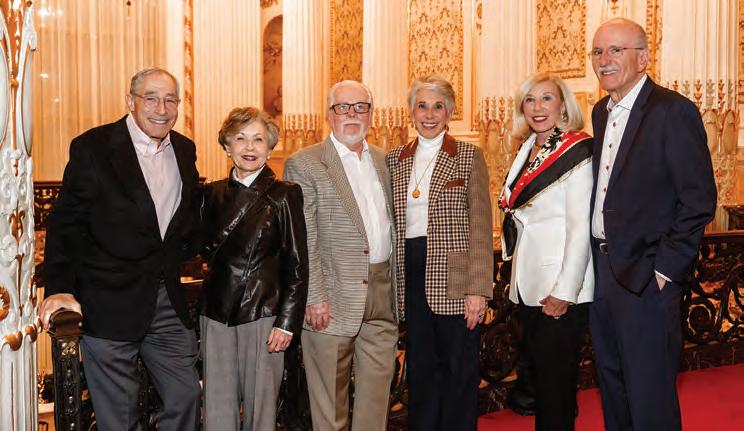
University and their leadership, which embraced the project and gave us a home for the exhibition.
CMU’s Posner Center gallery was beautifully curated, creating a perfect setting for the Violins of Hope. Hats off to Carnegie Mellon’s Sam Lemley and Heidi Wiren Bartlett, who curated the exhibit with sensitivity and special attention to every detail.
The main sponsors of this city-wide effort were the Jewish Federation of Greater Pittsburgh and the Howard and Betty Diskin Foundation. These two partners top off an exhaustive list of community foundations and individual donors — a roster of support that stretches pages long.
Pittsburgh is a shining example of what a city can accomplish when its many anchor institutions work together. Violins of Hope was successful beyond our wildest dreams and, in a world that is increasingly fractured and full of devastating news, this programming represented a welcome change of pace. It emerged as a rare beacon of solidarity, creativity and hope during a time of real tragedy and crisis — much like the very instruments it featured.
With gratitude,
Sandy Rosen, Chair
Pat Siger, Co-Chair
Lynn Zelenski, Project Manager


14 FEBRUARY 23, 2024 PITTSBURGH JEWISH CHRONICLE PITTSBURGHJEWISHCHRONICLE.ORG
p Oatmeal raisin cookies
Photo by Jessica Grann
Passover & the Primary
This year, Passover begins at sundown on Monday, April 22, and PA’s presidential primary is Tuesday, April 23.
If you’d like to vote by mail, request your mail ballot NOW and return it by 8 p.m. on April 23.
April 2024
All PA registered voters are eligible to request a no-excuse mail ballot by 5 p.m. April 16.
Your options to request a mail ballot include:
» Visit vote.pa.gov/ApplyMailBallot and request it online.
» Visit your county elections office, where you can apply for your mail ballot, receive it, complete it, and return it all in one visit.
» Complete a paper mail ballot application and send it to your county elections office.











PITTSBURGHJEWISHCHRONICLE.ORG PITTSBURGH JEWISH CHRONICLE FEBRUARY 23, 2024 15
123456 8910111213 7 1516171819 20 14 22 23 24 25 2627 21 2930 28 PASSOVER BEGINS PRIMARY DAY
DEADLINE TO APPLY
Have a question? Call the Department of State’s year-round voter hotline at 1-877-VOTESPA. Interpretation services are available in 200+ languages. Scan & apply for your ballot! Deadline to apply: 5 p.m. April 16
Life & Culture
Comedian Chris Monty plans to leave audience ‘rolling in the aisles’ during Chabad’s annual Jewish comedy night
By Adam Reinherz | Senior Staff Writer
Chris Monty was once eating in a restaurant with his wife when a tourist approached.
The comedian and his wife were enjoying a plate of chicken Parmesan. The vegan tourist asked the couple if they knew “how cruel it is the way they murder their animals.”
Monty ignored the question.
The tourist then asked, “Do you know what eating this food will do to your health?”
Monty replied that his grandmother just celebrated her 102nd birthday.
The surprised tourist asked, “Your grandmother eats meat?”
“No,” Monty said, “She minds her business.”
Monty, a New York-based comedian who opened for Joan Rivers and B.B. King, appeared in “Mall Cop: Blart 2” and has cracked more jokes inside Jewish Community Centers than your favorite uncle, is headlining Chabad of South Hills’ annual Jewish comedy night.
As a lead-up to the March 3 event, Monty spoke with the Chronicle by phone from his New York home.
Coming to Pittsburgh and appearing at Carnegie Stage, he said, is a chance for a more personal show.
“I’ve played big venues — I was with Julio Iglesias a couple of years ago, working

3,000-seat rooms — and now I’m working smaller, intimate, black box theaters in comedy clubs. I like the intimate, smaller settings,” he said. A lot of people don’t realize that the process of cracking quips varies given a space’s size, Monty explained.
If the performance is in front of thousands, “it takes longer for the joke to go out and come back with the laughter — you actually wind up doing less material because of the size of the room — where if you’re in a smaller setting you can get more stuff,” he said. Carnegie Stage seats fewer than 100 people.
That atmosphere should afford a fun and kosher repartee with the audience, Monty explained.
Those who assume that an entertaining evening requires ribald humor are mistaken, the comedian said: “I talk about family. I talk about being a husband, being a father, being an older guy who started late with my kids.”
“I was taught early on, when I started in this business, that if you write clean and work clean, you’ll work more. There’s more areas to plug into,” he added.
Monty can make a dirty joke — his Instagram account features some of his comedic depth — but most of his shows, especially ones for charity groups, eschew vulgarity.
“They don’t want to hear filth. You can be adult and you can talk about sex, they just don’t want to hear the graphic version of it. I can do it in a clean way. They enjoy that more and it’s funnier,” he said.
Monty, 51, has refined his craft for decades.
He spent three years opening for Joan Rivers during her East Coast tours.
The experience was fantastic, he said: “She was really down-to-earth and really cool. Really sweet.”
Though Rivers’ show was “a little bawdy,” she had a different persona off-stage, Monty continued: “She was genuinely just a great soul.”
“She had a line in her act where she said she wanted to have a Christmas tree because
she was tired of Hanukkah,” Monty recalled. “So she said she got the Nativity scene. She had the baby. She had little Jesus. And she got the baby a nanny because she’s Jewish.”
G ood humor can cross religious and demographic boundaries without being dogmatic, Monty said.
“There are comics that are opinionated in politics, or opinionated in whatever it is, and they just feel like, ‘Hey, well, I’m an artist and I want to say this so I’m saying it.’ God bless them, that’s fine,” Monty said. “I’m deliberate in the fact that I don’t want to talk about politics.”
So much of life is “everybody’s on one side, or the other side, and everybody hates everybody,” he continued. “I kind of feel like when you come to my show you want to get away from that.”
That’s how Monty is plugging his upcoming show with Chabad.
“We gotta get back to laughing,” he said. “We don’t laugh as a country anymore. Everybody’s so uptight about everything that’s going on. You gotta take time and just let the stress out, and just laugh.”
If that’s the audience’s charge, what’s the comedian’s responsibility?
“I’ll do my best to leave them rolling in the aisles,” he said. PJC
Adam Reinherz can be reached at areinherz@pittsburghjewishchronicle.org.
A new ‘Tradition’? PSO and CLO collaborate for ‘Fiddler on the Roof’ concert
this John Williams score, played by the amazing Pittsburgh Symphony Orchestra,” he said.
By Toby Tabachnick | Editor
Even without the aid of a matchmaker, it seems bashert that the Pittsburgh Symphony Orchestra and the Pittsburgh CLO would partner on producing a concert version of “Fiddler on the Roof.”
Fusing the talents of Broadway stars, local entertainers and the PSO’s 65-piece orchestra, the production, which runs Feb. 23-25 at Heinz Hall, will feature John Williams’ adapted Oscar Award-winning score to the 1971 film (which starred Chaim Topol and Norma Crane).
“I am thrilled to witness artists from each of our companies coming together to create a special performance that focuses equally on the music of this incredible show and the story it tells,” said PSO Vice President of Popular Programming Shelly Fuerte, who is also the executive producer for this concert.
While there will be an “emphasis on the music,” there’s also an 80-person choir and actors with assigned roles, CLO’s Executive Producer Mark Fleischer said.
But don’t expect a full-blown production of the musical that won nine Tony Awards.
“There’ll be minimal costuming to give suggestion — just sort of taking us through the show with enough clues and hints to give it a satisfying following for those who don’t know it. … There’s actually dialogue, there is movement, but really, at the heart of this is going to be
Fleischer said he is excited about the collaboration between the two cultural mainstays, something that’s been in the works for some time.
The PSO and CLO began exploring the idea of partnering shortly before the pandemic shut down theaters, he said. The idea was to produce a collaborative show to celebrate the 125th anniversary of the PSO, which coincided with the CLO’s 75th anniversary.
“ Then, we all know what happened,” Fleischer said.
But when theaters eventually reopened, talks to collaborate resumed.
“We always kept saying, ‘Is there something we can do together? How do we cross over our audiences?,’” Fleischer said, noting that creating partnerships has become “increasingly important for arts groups.”
The CLO and PSO wanted to do a “classic,” Fleischer said, and “Fiddler on the Roof” fit the bill. The CLO had not produced that show for some time, and its themes seemed appropriate in light of current events.
“Obviously, the connection with Anatevka and Ukraine was in our minds,” Fleischer said. “And also the way that Jews have been treated throughout history and yet survive, and yet we go on. We thought that story of resilience and tradition, and the evolving of this family in town, was really something that still spoke today.”
The production features Shuler Hensley as Tevye. Hensley starred in Broadway’s “The Music Man,” playing the role of Marcellus
Washburn with Hugh Jackman and Sutton Foster, and played Tom Kettle in Broadway’s “The Ferryman.”
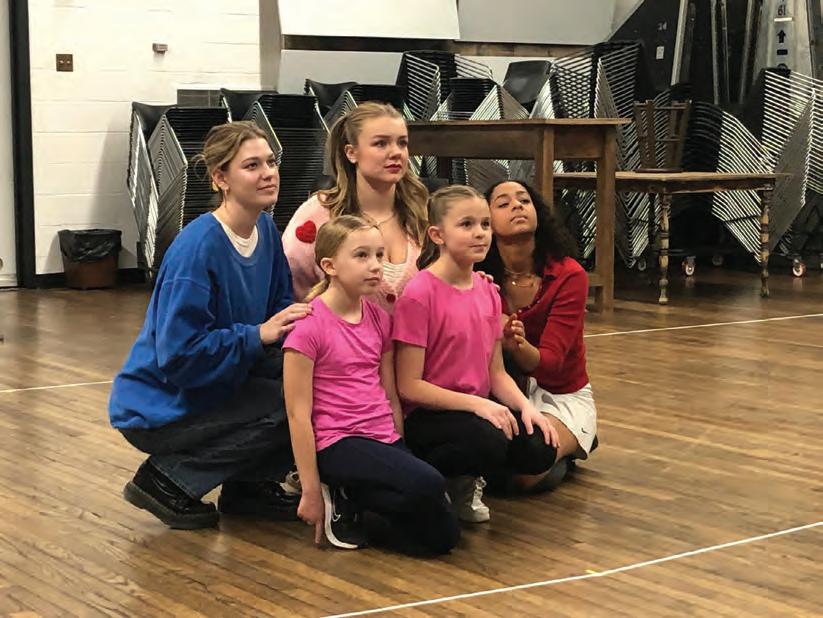
appeared on Broadway in “It Shoulda Been You,” “Funny Girl,” “Once,” “Sunday in The Park with George,” “Chicago,” “Assassins” and the original companies of “Thoroughly Modern Millie” and “Ragtime.”
The supporting cast is comprised of Pittsburgh talent including The Tamburitzans and students from the Carnegie Mellon University School of Drama, as well as the Hamlisch-Page Student Chorus under the direction of Christine Hestwood. Two young students from the CLO Academy of Musical Theater are also featured.
Fleischer is enthusiastic about the melding of national and local talent, something that the CLO is known for, he said.
symphony for this project, continuing that part of our mission, is really great.”
Andy Einhorn, who most recently served as the music supervisor and musical director for the Broadway productions “Hello, Dolly!” starring Bette Midler and “Carousel” starring Renée Fleming, will conduct the PSO. The show is directed and choreographed by Jewish Argentinian artist Gustavo Zajac, who directed Quantum Theatre’s “The Flying Lovers of Vitebsk” last fall in Pittsburgh. PJC
Toby Tabachnick can be reached at ttabachnick@pittsburghjewishchronicle.org.
16 FEBRUARY 23, 2024 PITTSBURGH JEWISH CHRONICLE PITTSBURGHJEWISHCHRONICLE.ORG
— COMEDY — — MUSIC —
p Cast of “Fiddler on the Roof” in rehearsal
Photo courtesy of Pittsburgh CLO
p Chris Monty is looking forward to an evening with Chabad of the South Hills.
Photo courtesy of Chris Monty
Saturday, March 9 7:30 pm
Saturday, March 9 7:30 pm
JCC PITTSBURGH
JCCSQUIRRELPITTSBURGH HILL ADMIT ONE
SQUIRREL HILL ADMIT ONE
Saturday, March 9 7:30 pm
JCC SQUIRRELPITTSBURGH HILL ADMIT ONE

PITTSBURGHJEWISHCHRONICLE.ORG PITTSBURGH JEWISH CHRONICLE FEBRUARY 23, 2024 17

Torah Celebrations
will become a bar mitzvah at Rodef Shalom Congregation on Saturday, Feb. 24, 2024. Cooper is the son of Justin and Megan Sigal. He is a seventh grader at Winchester Thurston. He loves playing sports with his three brothers. His favorite thing to do is to play ice hockey. This is his passion and why he has chosen to help teach younger kids how to play the game he loves as his b’mitzvah project. Cooper plans to continue his hockey development and growth in

• Meet with your student twice weekly for 30 minutes during the school day.
• Be part of an innovative pilot program that uses AI to create lesson plans tailored to your student’s progress.
• Choose from two locations: Catalyst Charter Academy or Clairton City Schools.
the QR Code to learn more and sign up for training or visit literacypittsburgh.org/impact-tutoring Questions? Email cgriffiths@literacypittsburgh.org



These next several weeks we’ll be reading the Torah passages about the Tabernacle, the home the Jews constructed in the desert for God’s Divine presence to dwell in their midst. Nachmanides explains that the people had just experienced a once-in-history experience together with God when He appeared at Sinai before all the people. That wasn’t going to happen again, but no one wanted the feeling of mutual closeness to dissipate. So God told the people to fashion a home for His presence, as it were, so that relationship would continue.
We have no Tabernacle today. But we, too, need to be alert to feel God’s presence in our lives and recognize how He interacts with us.
Rabbi Baruch Rosenblum, a prominent lecturer in Israel, tells of an encounter he had with a taxi driver who related a story from when he was in the army. The man’s platoon

had gone to sleep and, in the middle of the night, the guard on duty started screaming. Everyone ran over and they saw that a python had wrapped itself around his body and was about to strangle him. Suddenly, with his last breath, the guard shouted, “Shema Yisrael!’’ — the famous words from the prayer service — and instantly the snake slithered off of him.
“You should see that man today,” the driver said. “He became really observant and now he’s a big rabbi with a beard”.
“And what about you?” asked Rosenblum.
“Me? I’m fine. Why do you ask?”
“Well, weren’t you right there as well?”
“Me? It didn’t happen to me, it happened to him!”
Sometimes God comes calling, but we’re not prepared to respond. Unfortunately, we can’t always feel God’s closeness with us — but when He does come, let’s welcome Him into our lives! PJC
Rabbi Levi Langer is the dean of the Kollel Jewish Learning Center. This column is a service of the Vaad Harabonim of Greater Pittsburgh.








18 FEBRUARY 23, 2024 PITTSBURGH JEWISH CHRONICLE PITTSBURGHJEWISHCHRONICLE.ORG
Welcoming God inside LANDSCAPING Spring and Fall Cleanups Lawn Maintenance & Hauling 40 years serving Squirrel Hill & Point Breeze areas 724-826-0015 Dave Claffey Landscaping Business & Professional Directory CA$H BUYING DENNY OFFSTEIN AUTO SALES 7 DAYS 724 -2 87 -7771 DOMESTIC FOREIGN CARS TRUCKS SUVS VANS GOOD WRECKED MECHANICAL PROBLEMS LEGAL TITLE TRANSFER PURCHASED AT YOUR LOCATION BUYING – AUTOS BUYING: Grandma’s VERY Old Vintage/ Designer Clothing, Costume Jewelry, Hats, Box Purses, Cocktail-Evening Wear, Hawaiian, Prom & Prairie Dresses, Velvets, Bellbottoms, Jumpsuits, Platform Shoes, Go-Go Boots, etc $ Cash Paid - Will Pick Up! $ Toll Free 888-736-7242 BUYING Mon-Fri for someone that would like company to be with, play Scrabble, work on a puzzle or chat. Prepping & serving a meal, running errands, or grocery shopping. Open to discussing your specific needs for a friend or loved one. *Murrysville, Monroeville, Plum, Churchill Area, Forest Hills, Regent Square, Edgewood, Point Breeze, Squirrel Hill, Shadyside. *10 years experience *References & Clearances Carole 412-609-6197 www.TangledArtBoutique.com PART-TIME COMPANION CAREGIVER Rabbi Levi Langer Parshat Tetzaveh Exodus 27:20 – 30:10 We Prepare & E-File Your Federal, State & Local Tax Returns: taxpreparationpittsburgh.com stevec@keystonebydesign.com In-Person or Virtual 412-421-3999 • Individuals • Estates • Partnerships • Self-Employed • Cryptocurrency • PA Rent/Property Tax Rebate Stephen Cohen Keystone By Design PROFESSIONAL INCOME TAX PREPARATION SERVICE
Scan
MAKE A DIFFERENCE FOR A CHILD! VOLUNTEER AS A READING TUTOR! Get the news. THEN GET THE FULL STORY In the Pittsburgh Jewish Chronicle For home delivery, call 412-687-1000, ext. 2 Every Friday in the and all the time online @pittsburghjewishchronicle.org. For home delivery, call 410.902.2300, ext. 1. news JEWS CAN USE.
Obituaries
AUERBACH: Doris “Dolly” Auerbach, born May 15, 1928, died on Saturday, Feb. 17, 2024. Beloved wife of the late George Auerbach. Beloved mother of Karen Levine and Deborah (Andrew) Gespass. Grandmother of Julia Levine, Daniel Gespass, Samuel (Andrea) Gespass and Katy (Andy Lawrence) Gespass. Great-grandmother of Eve Lawrence and Lena Dolly Lawrence. Dolly was born in Czechoslovakia and fled the Holocaust, with her parents in 1939 to come to New York. A brilliant student, Dolly received her undergraduate degree from Brooklyn College where she met George, who was the editor of the Brooklyn College newspaper and later a financial writer and editor for The New York Times. After reading “The Feminist Mystique,” Dolly, a frustrated housewife, obtained a Ph.D. in German language and literature from New York University. She taught German language and literature in translation, as well as women’s studies at Fairleigh Dickinson University. Dolly was a voracious reader and a lover of culture. Dolly loved her family, but in addition to her husband, the feminist in her especially cherished her relationship with her daughters. A memorial service was held at Temple Sinai. Interment private. In lieu of flowers, contributions can be made to the Carnegie Library of Pittsburgh. Arrangements entrusted to Ralph Schugar Chapel, Inc. schugar.com
LABOVITZ: (Nov. 5, 1925 – Feb. 11, 2024) June (Solomon) Labovitz, a cherished resident of Pittsburgh, passed away peacefully on Feb. 11, 2024, at age 98 in her own home. She was married for 45 years to her loving husband, Lawrence, who passed in 1992. She lived a long life filled with love, joy and lasting memories. June is survived by her children, Chuck Lawrence and Adrienne Schmitz, who will forever hold her in their hearts. She was a devoted grandmother to David Schmitz, Emma Lawrence, Hannah Lawrence and Jack Lawrence. June would be the first to tell you how proud she was of them. She will be greatly missed by her beloved sister and lifelong best friend, Eileen Berger, numerous nieces and nephews, and Debbi and Kevin McLean, who showed her great kindness and generosity in her later years. A lifelong Pittsburgher, June’s roots ran deep in the community she called home. She volunteered at the Greenfield HAL Senior Center for many years and contributed to the Phipps Conservatory and Botanical Gardens. She rode the bus everywhere and was an avid walker, who could often be seen strolling the streets of Greenfield and Squirrel Hill. Her spirit will continue to live on in the hearts of all who were fortunate enough to know her. In lieu of flowers, the family kindly requests donations to the Greater Pittsburgh Community Food Bank in June’s memory. A memorial service to celebrate June’s life will be held at a later date.

SOLOMON: Evelyn June (Evie) Solomon joined her best friend, husband and love of her life, Alvin (Al) Solomon, in eternal rest on Sunday, Feb. 11, 2024. Our “sweetheart” would have been 95 years old on Valentine’s Day. She is survived by her children Eric Solomon and Tamra Marks of Monroeville, Pennsylvania, Ronna and Clay Spitz of Houston, Texas, and Louis and Sheri Solomon of Boca Raton, Florida. Evie was the beloved grandmother of Jason Spitz and Rebecca Schenker, Sarah Spitz and Adam Hockenberry and Shayna Solomon. She was also the loving great-grandmother of Ari and Ezra Spitz, and Julian Hockenberry. Evie was a lifelong and very proud resident of Pittsburgh. She attended Roosevelt Elementary and Taylor Allderdice Junior and Senior High Schools. Evie was completely devoted to her children and would do anything to make their lives happy. She would think up games to play with her grandchildren to keep them laughing. Evie had a wonderful sense of humor and could always brighten the mood with a joke or a song. She was very sociable, she made friends easily and she enjoyed having a pleasant chat with everyone she met, from friends and neighbors to waiters and grocery clerks. Some of her activities included writing skits for Jewish organizations and playing mahjong with friends. She started playing golf late in life with her husband, who was totally devoted to the game, joining the Clover Bells ladies golf league. The service and interment took place at Beth Shalom Cemetery on Tuesday, Feb. 13, 2024. Contributions in her memory can be made to the National Multiple Sclerosis Society (nationalmssociety. org/Donate), her favorite charity. Arrangements entrusted to Ralph Schugar Chapel, Inc. schugar.com
Jewish Association on Aging gratefully acknowledges contributions from the following:

A gift from ... In memory of...
Anonymous .Milton Abes
Jan & Edward Korenman . . . Evelyn Rebb
Jan & Edward Korenman Sidney Bilder
Linda & Jeffrey Reisner & Family William Davis
Myron Rosenberg . . . . . .Sam Rosenberg
Dorothy Samitz .Miriam W Steerman
Karen K Shapiro Dorothy Friedken
Rita Wenkert . . . . . . .Sadie Pearlstein
David A Wolfson Alexander Handmacher
Contact the Development department at 412-586-2690 or development@jaapgh.org for more information. THIS WEEK’S YAHRZEITS —
Sunday February 25: Dr Simeon Allen, Bella Bonder, Ida Sisser Bortz, Clara Cohen, Isidor Davis, Mildred Cohen Feldman, Alexander Handmacher, Bessie Kempler, Ella Klein, Ella Miller Lewine, Adolph Lobl, Helen Miller, Lucille Pollock, Aaron Pretter, Evelyn Rebb, Jean Y Shapera, Mollie Silverman, Minnie L . Sokole, Sadie M Speer
Monday February 26: Marjory S Eiseman, Dorothy Friedken, Rachel E Goldberg, Dr Norman Golomb, Lillian Hellman, Gerhart M Horewitz, Edwin Langue, Ida Levy, Isaac Marcus, Sylvia L Samuels, Hyman David Segal, Manuel Selker, Edna M Siegal, Goldie R Siegel, Genevieve Stern, Nathaniel Stutz
Tuesday February 27: Joseph Abravanel, Louis Cohen, Esther S Finkelhor, Mollie Friedman, Nisan Gilboa, Harry H Green, Johanna Halle, Harold M Harris, Martin A Hepps, Ruth Kaplan, Samuel Katz, Rosia Kauffman, Rose Kertman, Edward Lewis, Shirley F . Little, Judith Moritz, Benjamin Rambach, Sam Rosenberg, Mayme Sukolsky
Wednesday February 28: Frieda Alper, Mollie Chamovitz, Nathan H Gross, Ethel Miller, Hattie H Rapoport, Jacob M Rose, Rose Roth, Harry Scott, Ruth Stern, Joseph Zinner
Thursday February 29: Morris J Bialer, Estelle H Braver, Frank R Cohen, Goldie Davis, Anne S Debroff, Ike Diamond, Pearl M Feinberg, William Fried, Rebecca Friedberg, Nathan Glosser, Sadie C Heller, Sophie Hersh, Leonard B Jacobson, Lena Kaufman, Albert C Kramer, Samuel Linetsky, Payce Lipkind, Joseph M Orringer, Florence Schorin, Leonard L Schugar, Leonard Schwartz, Hyman Shalansky, Elvin Teitelbaum, Isaac Weis
Friday March 1: Samuel L Alpern, Leo Gitelman, Harry Greenwald, Jacob L Gropper, Lily June Kanarek, Morris Klein, Earl Lebovitz, Sam Lewinter, Carl Lieberman, Harry Margolis, Fannie Melnick, Abe Miller, Sally Miller, Ethel Bodek Rogers, Clara Saltman, Max Samuels, Manuel Wikes, George Wintner
Saturday March 2: Sidney Bilder, Henry Bloch, Bailie Anna Cohn, Sedalia Ekker, Clara Goldhammer, Frances H Gordon, Joseph Greenwald, Hyman L . Hausman, Abe Kirshenbaum, Edward Lewis, Jack Sarbin, Hannah Rae Shapira, Henry Weinberger, Samuel N . Whiteman, Joseph Wilkofsky, Manuel Zapler



Please
PITTSBURGHJEWISHCHRONICLE.ORG PITTSBURGH JEWISH CHRONICLE FEBRUARY 23, 2024 19
see Obituaries, page 20
In-Home Care Services Pittsburgh-247.ComfortKeepers.com Making Moments Matter •Companionship • Light Housekeeping •Transportation and Errands • Personal Care Services Most offices independently owned and operated. • ©2015 CK Franchising, Inc.




















Sign up on the right hand side of our homepage.
Sign up on the right hand side of our homepage.







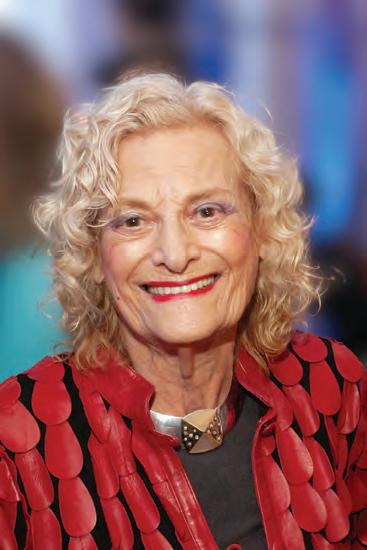
Sign up on the right hand side of our homepage.
SPITZ: Phyllis Hersh Spitz, on Thursday, Feb. 15, 2024. Devoted wife of the late Richard M. Spitz; mother of Charles (Mindy) in Boston, William (Meryl Reis) in Philadelphia, and Kathryn (Jeffrey Spitz Cohan) in Pittsburgh; loving “Mimi” to her six grandchildren, David, Lauren, Barbie, Dan, Sarah and Kiley; and seven great-grandchildren, all of whom she truly loved “a bushel and a peck ...” Phyllis had a tremendous outgoing character that made her great friends with all who knew her over many years in Pittsburgh, Florida and elsewhere. She was a kindergarten teacher early on, and then became a top sales associate at Kaufmann’s Department Store for many years. She also enjoyed volunteering her time at many organizations, including the Morikami Museum and Delray Medical Center in Florida. Services were held at Rodef Shalom Congregation. Interment West View Cemetery of Rodef Shalom Congregation. Contributions in her memory may be made to Film Pittsburgh, 1789 S. Braddock Ave. #565, Pittsburgh, PA 15218 (filmpittsburgh.org) or to the charity of your choice. Arrangements entrusted to Ralph Schugar Chapel, Inc. schugar.com PJC
Sign up on the right hand side of our homepage.
pittsburghjewishchronicle.org
pittsburghjewishchronicle.org
pittsburghjewishchronicle.org
pittsburghjewishchronicle.org
Sign up on the right hand side of our homepage.
pittsburghjewishchronicle.org


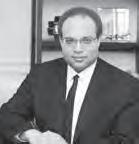



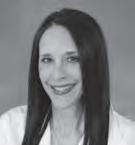



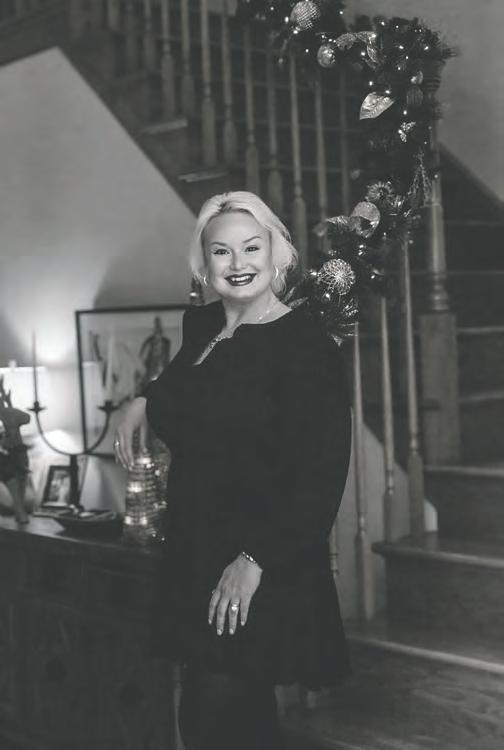

20 FEBRUARY 23, 2024 PITTSBURGH JEWISH CHRONICLE PITTSBURGHJEWISHCHRONICLE.ORG Obituaries Obituaries:
from page 19 REALTOR®,GREEN,SRES REPRESENTINGPITTSBURGH’S MOSTCOVETEDADDRESSES 412-231-1000OFFICE 412-215-8056MOBILE WWW.RUBINOFFREALTY.COM MelissaReich Buyingor sellingahome? Icanhelp RUBINOFFREALTY Real Estate Contact me today to discuss all of your real estate needs! Sherri Mayer, Realtor Squirrel Hill Office C: 412-760-0412 O: 412-421-9121x225 sherrimayer@howardhanna.com HowardHanna.com REALTOR SERVICES Smith-Rosenthal Team Jason A. Smith & Caryn Rosenthal Jason: 412-969-2930 | Caryn: 412-389-1695 Jasonasmith@howardhanna.com Carynrosenthal@howardhanna.com Are You Buying or Selling a Home? Let Us Guide You Through the Process! CALL THE SMITH-ROSENTHAL TEAM TODAY. 5501 Baum Blvd. Pittsburgh PA 15232 Shadyside Office | 412-361-4000 Please support our advertisers, and mention that you saw their ad here. We depend on them, and they depend on you!
Continued
The Original Our Only Location At 2145 BRIGHTON ROAD • PITTSBURGH, PA 15212 • 412-321-2235 Serving the Jewish Community Since 1924 THE BEST OF THE h IN YOUR EMAIL INBOX ONCE A WEEK.
THE BEST OF THE h IN YOUR EMAIL INBOX ONCE A WEEK.
THE BEST OF THE h IN YOUR EMAIL INBOX ONCE A WEEK.
THE BEST OF THE h IN YOUR EMAIL INBOX ONCE A WEEK.
THE BEST OF THE h IN YOUR EMAIL INBOX ONCE A WEEK.







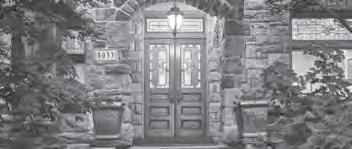
























PITTSBURGHJEWISHCHRONICLE.ORG PITTSBURGH JEWISH CHRONICLE FEBRUARY 23, 2024 21 www.pittsburghjewishchronicle.org JILL and MARK PORTLAND RE/MAX REALTY BROKERS 412.521.1000 EXT. 200 412.496.5600 JILL | 412.480.3110 MARK FOR SALE POINT BREEZE • $599,000 First Time O ered Sophisticated 2 bedroom 2.5 bath home with sparkling hardwood floors, and lots of light pouring in, a sleek gourmet kitchen, private outdoor courtyard, and a 2 integral garage. Steps from Point Breeze’s vibrant business community. Easy access to Frick Park, Shadyside, Downtown and Oakland. Very Special. WEST SHADYSIDE • $1,500,000 5033 Castleman St On one of West Shadyside’s most desirable streets. The stone home has been enlarged to maximize indoor and outdoor enjoyment. Enjoy gorgeous grounds with lush perennial gardens, a newly added and expansive 1st floor deck and private 2nd floor balcony. Generously sized rooms with hardwood floors, modern conveniences and intricate stained glass. The gorgeous chef’s kitchen features stainless steel appliances, rich wood cabinetry, a marble service bar and an eat-in booth. Upstairs you’ll find 5 bedrooms, updated baths, laundry room and a study. Enjoy the wine cellar in the lower level. SHADYSIDE • $469,000 2 bedroom 2 bath home steps from the main shopping area on Walnut Enjoy the sexy closed in private patio with a 2 car garage Home has a main floor laundry, hardwood floors, and stained glass. Access to Bakery Square, Hospitals, Universities and much more. Andrea Ehrenreich (412) 327-7665 $525,000 New Listing Real Estate Services Howard Hanna Squirrel Hill Office (412) 421-9120 540 N Neville St. #201 2 bedrooms, 2 full baths, 1,800 sq. feet Riki Rudolph (412) 616-9626 412-661-4456 www.kaminrealty.kamin.com 5125 Fifth Ave. 2 & 3 Bedrooms Corner of Fifth and Wilkins Spacious 1500-2250 square feet ”Finest in Shadyside” www.kaminrealty.kamin.com FOR RENT Mary Simpson (O) 724-776-9705 (C) 412-613-0249 MUST SEE! MOVE-IN READY! • 5 beds/4 baths • Spacious rooms & high ceilings • New appliances throughout • Second floor laundry • Large finished basement with new half bath • 2-c ar detached garage WALK TO SHOPS, DINING, SCHOOLS AND PARKS! OPEN HOUSE Sunday, February 25 12:00pm – 2:00pm Price Reduced $714,000 5826 Hobart Street Squirrel Hill, PA 15217 News for people who know we don’t mean spiced tea. Every Friday in the and all the time online @pittsburghjewishchronicle.org. For home delivery, call 410.902.2300, ext. 1. Chai

22 FEBRUARY 23, 2024 PITTSBURGH JEWISH CHRONICLE PITTSBURGHJEWISHCHRONICLE.ORG 3603 McRoberts Road Whitehall Borough, PA 15234 1001 Hastings Park Drive Bridgeville, PA 15017 412-504-7601412-228-5144 South Hills Square Chartiers Bend
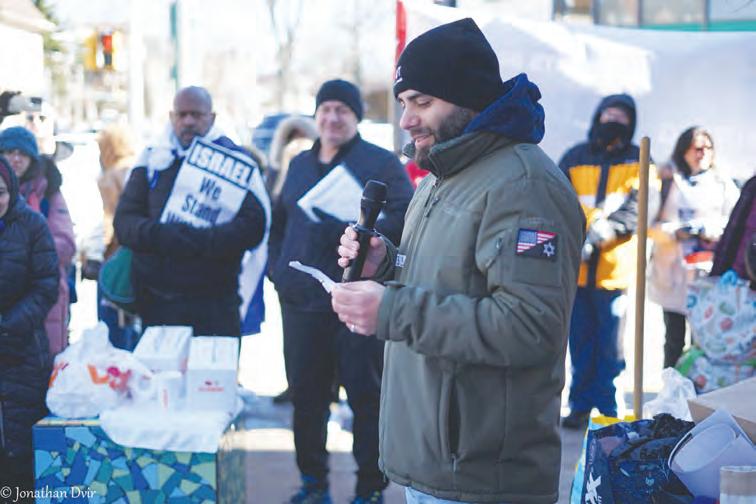
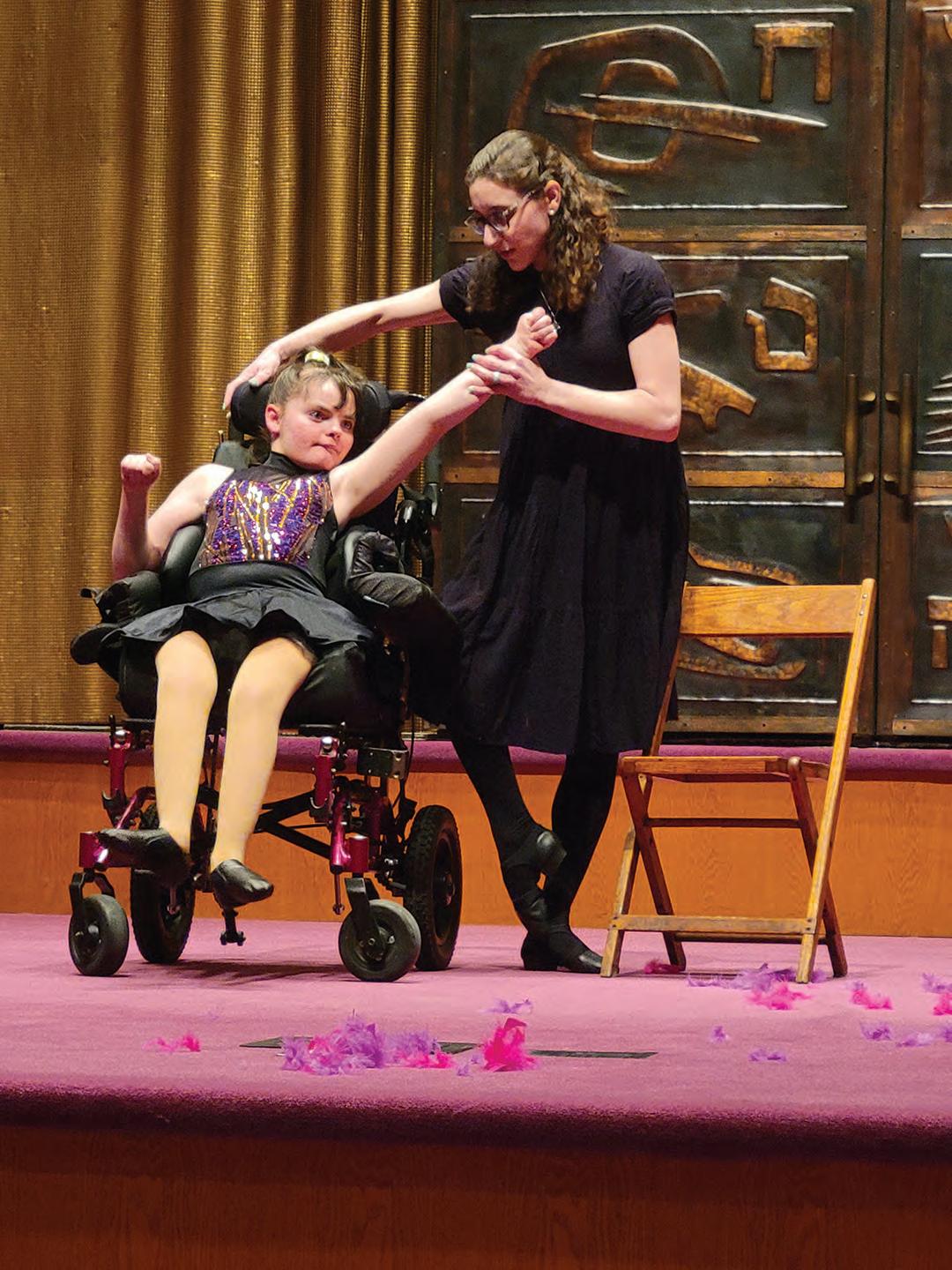

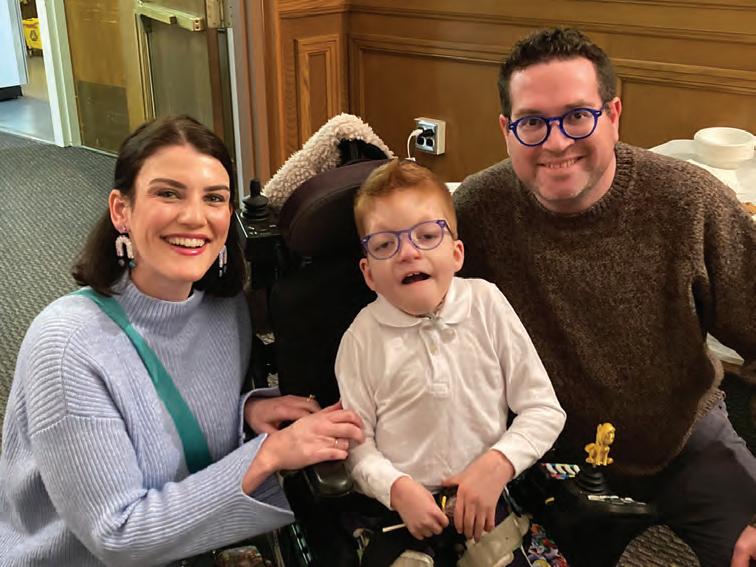


PITTSBURGHJEWISHCHRONICLE.ORG PITTSBURGH JEWISH CHRONICLE FEBRUARY 23, 2024 23
Community
p Justice, justice shall you pursue.
Photo courtesy of Tahara Reinherz
Bring them home Community members braved freezing temperatures while standing on the corner of Murray Avenue and Darlington Road in Squirrel Hill to demand the release of an estimated 134 hostages held by Hamas terrorists since Oct. 7. The Feb. 18 demonstration signaled to elected officials that community members remain committed to seeing the hostages returned home.
p Squirrel Hill resident Isaac Nadoff describes his recent service to Israel.
p City Controller Rachel Heisler participates in the Feb. 18 demonstration. Photos by Jonathan Dvir
Nothing tastes better than free Students enjoy free kosher dinners every Wednesday at Chabad at Pitt. Conversation and Jewish learning included.
p Rabbi Shmuli Rothstein, right, joins Pitt students. Photo courtesy of Chabad House on Campus
Temple Sinai celebrated Jewish Disability Awareness and Inclusion Month and honored Sam Skobel, the 2024 recipient of the Shore-Whitehill Award. The Feb. 17 program included Havdalah, an award presentation and performances by Sam Skobel and students from Cynthia’s School of Dance, as well as from Dancing Wheels Company & School, a professional physically integrated dance
p p
Photo by Tami Opyoke Prine

24 FEBRUARY 23, 2024 PITTSBURGH JEWISH CHRONICLE PITTSBURGHJEWISHCHRONICLE.ORG



 By David Rullo | Senior Sta Writer
By David Rullo | Senior Sta Writer








 James Gibson is “failing retirement.”
James Gibson is “failing retirement.”

















































































































































































